Photo





Symbols in Renaissance Art: Coral
Often more subtly placed in paintings, coral was quite popular among Renaissance elites. Not only were the shells exotic and expensive, but the vibrant red hue symbolized significant religious and secular beliefs. In some Madonna and child scenes coral can be found strung above the figures or worn by the infant Christ as a necklace, foreshadowing the Passion. The precious stone was thought to have mystical qualities and beaded necklaces were gifted to children as protective amulets (it also doubled as a teething toy). For women, the brightly colored beads symbolized their fertility and vitality.
3K notes
·
View notes
Note
I was wondering what you knew about Cesare's only legitimate child, Louise Borgia? I'm so curious about her life and her relationships with the people around her, but there's not really much i could find, which is strange considering she was the heir of both her father and mother, and lived till a decent age? Is there anything more we know of her and her life?
Hm, probably the same as you, anon. Sadly there isn’t much information available about her. I think you may already checked out Miron’s work about Charlotte, which brings some information about Louise, so I checked out Sacerdote’s bio to see if I could find anything “new”, but I think he mainly just used Miron’s work. In any case, I’ll add here what I could gather:
Louise kept up a continuous correspondance with her aunt, Lucrezia ,although as far as I know these letters were never published, which it’s a shame, it would be interesting to read them. After her mother died (1514), she was placed under the guardianship of Louise of Savoie, Francis I’s mother. It seems there was conflict between them, in regards to Louise’s assets and the terms in the guardianship etc, but also maybe a clash of personalities.
That made Louise appeal to her grandfather, Albret d’Albret, and then interestingly enough to Isabella d’Este, you probably already read this letter, but just in case, I’m posting it here:
"Madame, with all respect I commend myself to your good grace. Madame, that which I desire above all else in the world is to hear how my good relations and friends are and prosper, and to be advised of you and of Madame the Duchess, my aunt. I have given charge to and sent the bearer of this letter to see you, and to advise me of your news. I beg of you, Madame, to send me news of you by him in full. And if it pleases you to hear of mine, he will inform you amply. Madame, I have also charged him to tell you something else from me. I beg of you to believe it, and to be good enough to help in the matter of which he will speak to you. And in doing so you will make my gratitude always yours. Praying Our Lord to give you a very good and long life. Written at Auxonne this ninth day of July, 15. "Your very humble niece and good friend, Louise de Valentinois." It's interesting that Louise felt she could write to Isabella d'Este, even though the marriage alliance between her and their son, Federico, failed to succedded. It's pretty clear, by the tone of the letter, that some political intrigue was going on, whether it was Louise wanting to know more about her father's inheritance in Italy, or gauging the possibility of the above mentioned marriage alliance her father tried to make with the Gonzaga, perhaps with her aunt Lucrezia helping her with it, as well, given her close relations with the Marquis of Mantua, Isabella's husband. It's possible she was searching for other options, and if that is so, then it implies she wasn't very willing to marry Trémoille. Personally, I find his interest in her a little strange, maybe Louise felt it, too, who knows. Sacerdote says the followingabout this letter:
The letter has no date; but it was certainly written after 1514 - the year of Charlotte d’Albret's death - and before 1517, the year of Louise' marriage. As for the "matter", in which she wanted to interest Isabella d 'Este, it is very likely that it was her inheritance, left to her by her father in Italy. It is known, in fact, that Cesare Borgia had a very high sum on deposit with Genoese, Venetian and Florentine bankers; and before fleeing to Naples he had entrusted to his friend, Cardinal Vera, all his gold and silverware and carpets and other things of value, so that, if he came to die, they were to be sent to his wife. [...] As for the other "affair", her engagement with Federico Gonzaga, son of Isabella, had definitely ended. It begun as early as December 1501, the negotiations for this engagement were then conducted with fervor on both sides. Despite the great aversion that Isabella d'Este and her husband Francesco Gonzaga felt for the Borgias, they nevertheless knew that such a relationship would have a high political value for their house and for their state.
In 1516, Federico Gonzaga was sent to Paris, and he and Louise saw each other, and at the time there was talk about finally making the marriage alliance between the two Houses happen, but for reasons unknown, it failed again. There was also talk of a marriage between Louise and the Medici, with Piero de Medici’s son, Lorenzo de’ Medici.
It seems the prejudice against the Borgia family, esp. against Cesare, ended up touching Louise as well. There was some effort to ignore, or to "look past" Louise' bloodline on her father's side. For example, when Louis II de la Trémoille, her first husband, was asked as to why he chosed the daughter of Cesare Borgia (such a wicked man to their eyes) as a wife? To placed her on the same bed as his former wife, Gabrielle de Bourbon Montpensier? He allegedly is recorded as having answered: “La mia scelta cadde su madamigella de Valentinois, perché ella discende da una razza, la virtù delle cui donne non fu mai posta in questione. /My choice has fallen upon Mademoiselle de Valentinois because she springs from a race whose women's virtue has never been called in question."
As Sacerdote (and Miron) point out, he clearly wasn't talking about the Borgia women, so he was implying that as far as he was concerned, Louise was entirely from d'Albret and their lineage's bloodline, and as such he knew Louise had inheritated the virtues known in her mother and the women’s side of that family, which was why he chose her as his bride.
Louis died in battle, at Pavia in 1525, and Louise re-married Philippe de Bourbon in February 3, 1530. I couldn’t find anything about her relationship with her second husband, which it’s a shame, because that’s something I would like to know more about myself. They have six children:
Claude de Bourbon, Count of Busset, of Puyagut, and of Chalus.
Marguerite de Bourbon
Henri de Bourbon
Catherine de Bourbon
Jean de Bourbon, Seigneur of La Motte-Feuilly and de Montet.
Jerome de Bourbon, Seigneur de Montet.
And iirc by this bloodline, there are still many living descendants today of Cesare and Charlotte.
Louise was a member of the Third Order of Saint Dominic.
She always signed herself as Duchesse de Valentinois, comtesse di Diois, and in a document dated June 18, 1535. It seems she was party to a transaction between her and her cousin, Henri de Navarre, touching the “droits de légitime” (portion that a child has by law in his father’s estate) of her mother, Charlotte d’Albret.
And that’s about all I could gathered, anon, the other Borgia bios I have checked either don’t have anything or they just repeat what was established by Miron and Sacerdote and some French authors. Sorry if it wasn’t too helpful, I really wish we knew more. Again, I'd love to see the letters between Lucrezia and Louise published. I think it would give us more information about her, but as far as I know it hasn’t been.
11 notes
·
View notes
Note
hi!! do you think the real life cesare borgia, not cesare borgia from the tv series the borgias, was also jealous of juan or wanted to pursue a military career?
well my personal opinion after reading most of the biographies about the family is that i don't think the historical cesare was jealous of juan (or even killed him tbh). not only is there no historical evidence supporting that claim, but there also isn't a single recorded instance of cesare expressing strong resentment toward or actively rebelling against the ecclesiastical career rodrigo chose for him. like there's nothing, not even an anecdote, suggesting he was trying to break away from it. but in showtime's the borgias (and nearly every other borgia adaptation), the story leans into rumors and dramatization because the more scandalous the better.


machiavelli and others perpetuate many myths such as the claim that juan was having an affair with lucrezia and provoking cesare's jealousy, that allegedly cesare and juan had an affair with sancia of aragon, as well as the 1497 report by a roman ambassador stating "many efforts are made to hide it, but these sons of the pope are consumed by envy for each other." but even so, there's no concrete evidence that cesare harbored jealousy, let alone murderous intent. it's also worth noting that cesare received just as much appreciation and affection as juan. it's why i don't think he would've been jealous of anything juan had. some scholars even argue he received more. when you consider that ecclesiastical offices brought significantly more wealth and security than secular ones, rodrigo's trust actually seems to have leaned more toward cesare. he was the one who was always by his side...

(showtime's the borgias leaned into this narrative. the "juan is rodrigo's favorite son" storyline unfolds gradually throughout the show not just because it exists in cesare's mind (as he interprets rodrigo denying him the position he covets as proof that juan is the one rodrigo relies on most.) in truth juan is the weaker and more vulnerable of the two brothers which is precisely why rodrigo indulges him. cesare, on the other hand, is not only the son rodrigo truly trusts and confides in, but also his true heir...the one meant to carry on his legacy. rodrigo's own self loathing prevents him from showing open affection to cesare. many watchers adopt cesare's perspective as fact, but the narrative actually invites us to consider juan's point of view like his insecurity about rodrigo's love and the pressure he feels from the position he's been given. that pressure drives him to meet expectations even through dark or destructive means. rodrigo doesn't let juan's failures slide and he lashes out at him and even exiles him to spain to shape up. while this punishment is justified especially after the paolo incident, it also proves that rodrigo holds juan accountable contrary to what cesare believes. by the end of the show, rodrigo names cesare as his successor. he rewards him with command of the papal army (the very position cesare killed juan to obtain) but it's only after rodrigo accepts himself that he's able to fully accept cesare as his favorite. in short cesare is everything rodrigo wanted in a son, reflecting both the best and worst parts of himself. he is, in many ways, rodrigo's extension.)
that being said, any real evidence of jealousy cesare may have felt toward juan comes from burchard's journal. he notes that juan played a stellar role at lucrezia's wedding, leading her arm in arm to her husband and the wedding guests, while cesare appeared as an "insignificant figure in ecclesiastical black." as burchard put it, "as only an ecclesiastic, cesare had very definitely a secondary rank at this wedding, where his brother don juan was the leading figure."

(cesare's signature to his letters to juan: “del vostro ratello che vi ama cone sé stesso” || “your brother who loves you as much as he loves himself")
in fact, the historical cesare seemed to genuinely care for juan despite his flaws. in their surviving letters to each other, even when cesare scolded juan or expressed disbelief, he did so with calmness, affection and even a touch of humor. cesare was never condescending toward him. he didn't reprimand him harshly but instead tried to guide him with a direct yet gentle tone. when juan was appointed commander of the papal army, cesare's response was strikingly warm. especially the part where he wrote, "i am all the more happy for the very great love i have for you." with a loving tone, and not a hint of jealousy about juan being a gonfaloniere. he even signed the letter with, "from your brother who loves you as he loves himself" (a line that the show twisted into something negative). juan also signed his letters to cesare with "from your obedient brother, duke of gandía."
after juan's untimely fate, it wasn't just their father who was overcome with grief, cesare was deeply affected too. according to sarah bradford, he became superstitious, anxious and depressed especially after inheriting a position that had once belonged to his dead brother. taking over that role seemed to trigger premonitions and fears of suffering a similar fate. juan's widow, maría enríquez de luna, openly accused cesare of being responsible for her husband's death (since at the time suspicion centered heavily on him), there's also a compelling passage from gustavo sacerdote (an italian essayist) in one of his biographical works. reflecting on cesare's manner and treatment of his brother, he writes: "the letter from cesare borgia is also interesting from another side. it is one of the few pieces of writing from his private and family correspondence that have come down to us; [...] if we stick to the words contained in it, the fraternal love that flows from it, from the first to the last word, shows us an affectionate, effusive cesare, full of tenderness for his younger brother, very different from the grim borgia who usually appears before our eyes in history."
while jealousy and ambition make for great tv, the historical borgia family was (as far as i've researched) a tight knit family, and cesare borgia comes across as loyal, measured and genuinely affectionate toward his family (at least up until juan's death).
13 notes
·
View notes
Note
Hello ! About Cesare's favorite song you been stated before in his fun facts post , I would like to ask if you have more note about his taste in music in general ? And I happen to heard that he have interested in poems and literature also so i want to know more about it
Lastly , If it not too much I would like to ask if you had any copy of donna contro la mia voglia lyrics ? thank you so much
Hi! as far as I know this song is the only one we know about his music taste :( there are various mentions about him going to festivities, dancing all night long, but it doesn't really say anything about the kind of music he (and also his sister, Lucrezia) prefered to dance to. It's possible he might have liked the Spanish music of the time period, along with the Roman ones, since he grew up in the Roman court, but I personally never found anything about it. As for his interest in poems and literature, he was certainly very well-read, it seems Serafino Aquilano was his favorite poet, and given Aquilano was a follower of the Petrarchism movement, it's possible to say Petrarch might have been another favorite of his, and speculate that if he wrote poetry, it might have been in that form/style. But other than that, there's nothing direct about it, unfortunately. I'd love to know which were his favorites books and other authors *sighs*. One cool thing, though, that's generally overlooked and neglected by Borgia authors, is that he was actually an important patron of the arts and literature of his time, and a cool fact is that under his patronage, the first printing press was established in Italy, in 1501 at Fano, by Girolamo Sancino iirc. And about the lyrics, Sacerdote's bio about Cesare has a copy of it, also Woodward's. I don't have them at hand at the moment to post it here.
8 notes
·
View notes
Text
Machiavelli Resources
Only like 1-10 people care about this but whatever
Translated primary sources:
Can be found as books of their own:
- The Prince
- Discourses on the First Decade of Titus Livius [Discourses on Livy]
- The Art of War
- The History of Florence
Collections of Machiavelli’s works:
- Machiavelli, the Chief works and Others (all volumes) [Trans. Allan Gilbert] {includes his plays, legations and other political writings!}
- Opere di Niccolò Machiavelli (all volumes) [Italian]
Correspondence/Letters:
- Machiavelli and His Friends: Their Personal Correspondence [Trans. James B. Atkinson and David Sices]
Plays:
- The Comedies of Niccolò Machiavelli: The Woman from Andros; The Mandrake; Clizia [Trans. James B. Atkinson and David Sices]
Secondary sources, as categorised below:
Biographies:
- Niccolò’s Smile [Maurizio Viroli]
- The Life of Niccolò Machiavelli [Roberto Ridolfi]
- Machiavelli: A Portrait [Christopher S. Celenza]
- Machiavelli: A Very Short Introduction [Quentin Skinner]
Machiavelli, his philosophies, and the interpretations and influence that follows it:
- Machiavelli: Founders of Modern Political and Social Thought [Maurizio Viroli] {Analysis on Machiavelli’s beliefs}
- Machiavelli in Hell [Sebastian de Grazia] {Machiavelli and Religion}
- Machiavelli’s God [Maurizio Viroli] {Machiavelli and Religion}
- Redeeming The Prince: The Meaning of Machiavelli’s Masterpiece [Maurizio Viroli] {Analysis of The Prince}
- Machiavelli and the Orders of Violence [Yves Winter] {Politics and morals}
- Against Throne and Altar: Machiavelli and Political Theory under the English Republic [Paul E. Rahe] {Machiavelli’s influence in the English Revolution and Republic}
- Between Form and Event: Machiavelli's Theory of Political Freedom [Miguel E. Vatter] {Anarchist interpretation of Machiavelli}
- The Modern Prince [Antonio Gramsci] {Marxist interpretation of Machiavelli}
- Hegemony and Power: On the Relation between Gramsci and Machiavelli [Benedetto Fontana] {Analysis on Gramsci’s Marxist views on Machiavelli}
- The Feminist Interpretations of Niccolò Machiavelli [Maria J. Falco] {Machiavelli and feminism}
- Fortune is a woman: Gender and Politics in the Thought of Niccolò Machiavelli, With a New Afterword [Hanna Fenichel Pitkin] {Machiavelli and gender in politics}
- Machiavelli's Gospel: The Critique of Christianity in the Prince [William B. Parsons] {The Prince and Christianity}
Machiavelli and his social circle:
- The Artist, The Philosopher, and The Warrior: The Intersecting Lives of da Vinci, Machiavelli and Borgia and the World They Shaped [Paul Strathern] {Machiavelli, da Vinci and Cesare Borgia}
- Machiavelli, Leonardo, and the Science of Power [Roger D. Masters] {Machiavelli and Leonardo da Vinci}
- Fortune is a River: Leonardo Da Vinci and Niccolo Machiavelli's Magnificent Dream to Change the Course of Florentine History [Roger D. Masters] {Machiavelli and Leonardo da Vinci}
- Between Friends: Discourses of Power and Desire in the Machiavelli-Vettori letters of 1513-1515 [John M. Najemy]
Other sources:
- Machiavelli and Republicanism [Edit. Gisela Lock, Quentin Skinner, Maurizio Viroli]
- The Cambridge Companion to Machiavelli [Edit. John M. Najemy]
- Machiavelli Then and Now: History, Politics, Literature [Edit. Sukanta Chaudhuri, Prasanta Chakravarty]
- Machiavelli in Love: Sex, Self, and Society in the Italian Renaissance [Guido Ruggerio]
56 notes
·
View notes
Note
Hello ! About Cesare's favorite song you been stated before in his fun facts post , I would like to ask if you have more note about his taste in music in general ? And I happen to heard that he have interested in poems and literature also so i want to know more about it
Lastly , If it not too much I would like to ask if you had any copy of donna contro la mia voglia lyrics ? thank you so much
Hi! as far as I know this song is the only one we know about his music taste :( there are various mentions about him going to festivities, dancing all night long, but it doesn't really say anything about the kind of music he (and also his sister, Lucrezia) prefered to dance to. It's possible he might have liked the Spanish music of the time period, along with the Roman ones, since he grew up in the Roman court, but I personally never found anything about it. As for his interest in poems and literature, he was certainly very well-read, it seems Serafino Aquilano was his favorite poet, and given Aquilano was a follower of the Petrarchism movement, it's possible to say Petrarch might have been another favorite of his, and speculate that if he wrote poetry, it might have been in that form/style. But other than that, there's nothing direct about it, unfortunately. I'd love to know which were his favorites books and other authors *sighs*. One cool thing, though, that's generally overlooked and neglected by Borgia authors, is that he was actually an important patron of the arts and literature of his time, and a cool fact is that under his patronage, the first printing press was established in Italy, in 1501 at Fano, by Girolamo Sancino iirc. And about the lyrics, Sacerdote's bio about Cesare has a copy of it, also Woodward's. I don't have them at hand at the moment to post it here.
8 notes
·
View notes
Photo

Even the populations he subdued exalted him and the inhabitants of a city he conquered, Imola, recalling the tyrants who had oppressed them before Cesare Borgia came to “redeem them”, even called him a divine minister of justice. Some diarists, to Cesare’s contemporaries, attribute him all sorts of crimes, and deny him any civil, guerrilla or political virtue. Romagnosi, wrote that “passing under government of Valentino Borgia was a real gain for many cities”. Ercole Strozzi, the humanist poet Ferrarese, in his Latin epic about Caesar’s death called him “great in peace and great in war, hope of Mars and our hope,” to represent him - we will say in Carducci’s words - “a man sent by Providence to restore the empire and the glory of Rome, like the man who was to unify Italy.” With such contrast, the stories of Cesare Borgia begin and continue throughout the centuries, in songs and chronicles. Among historians as well as poets, both ancient and modern, there is a deep abyss, which seems unbearable. They talk about blood, lust, and incest. Others see the slander everywhere. Not to mention flatterers and denigrators for interest and partisan inspiration.
6 notes
·
View notes
Text
In the autumn of 1491, Cesare moved to the University of Pisa. Founded by Clement V in 1343, the Studio of that mighty city had also been the victim of the wars and the politics of Pisa. The University had lost all importance until Lorenzo de’ Medici rekindled it. Intelligent and munificent patron, he gathered some of the most learned scientists and scholars of Italy: and when the University of Pisa reopened in November 1473, there were among the most distinguished professors the famous Milanese jurisconsult Filippo Decio, the youth of every part of Italy and also of other countries rushed to attend at his courses. At these lessons we see sitting in 1491 and 1492, Cesare Borgia, assiduous to the study also in the midst of numerous and thunderous amusements. Before leaving, however, the sixteen-year-old university student made another big step in ecclesiastical career. On September 12, 1491, Pope Innocente VIII gave him the bishop’s dignity, assigning him the diocese of Pamplona, one of the most important in Spain, and that was a high moral and monetary value. The Spanish clergy was outraged to see how this little boy was covered with benefits. The same exasperation invaded the clergy of Pamplona. Such indignation that Rodrigo Borgia himself had to intervene to announce that office “a los magnificos nostros especiales amigos, los Alcades”. Rodrigo told to Pamplona that Caesar’s promotion had taken place “por sus meritos, virtudes et doctrina”. At sixteen! Then, Cardinal Rodrigo, not wanting to say that Caesar is his son, declares to be “a person closely associated with us”. Finally, ask them to obey the will of His Holiness. Even Caesar, the neo-bishop, who was then in Soriano, to spend perhaps his university holidays, hurried to write to his new “sheeps” the following pastoral letter:
Especial Friends, — You doubtless have already learned from letters of the Reverend Cardinal, Vice-Chancellor of the Church, that, the Episcopal See of your city having become vacant in conse- quence of the death of the Reverend Sefior Don Alfonso Carillo of blessed memory, his Holiness, the Pope, and the Reverend Seniors constituting the Sacred College, unanimous in their choice, have promoted us to this dignity, and have placed in our hands the bulls and briefs which we hereby tender for your examination. Solicitous for the future good government of the bishopric, spiritual as well as temporal, we send to you the venerable Mossen Martin Zapata, the beloved and esteemed canon and treasurer of Toledo, as our representative, duly empowered to decide all matters in our stead. We have specially instructed him to confer with you regarding a number of matters, and we urge you to trust him in all things and to shoW him all confidence. I expect you also of your own goodwill to aid and serve him. Should anything special arise affecting your noble city and the general welfare of yourselves and the community you may rest assured that we will give it the same attention that we would bestow on any affair of our own. I have only to add that I pray the Lord to take your honourable and noble persons under his protection. From Soriano the XVII day of September, MDLXXXXI. Ever yours to command, Cesar de Borgia, Elector of Pamplona
Pamplona clergy continued to be outraged. The Pope Innocente VIII had to take action with a “monitorium penale” against all those who wanted to usurp Pamplona’s seat.
Source: Cesare Borgia: la sua vita, la sua famiglia, i suoi tempi by Gustavo Sacerdote
4 notes
·
View notes
Text
“An important suggestion of what happens in Valentino’s mind told by the Cesenate chronicler, Giuliano Fantaguzzi, in september 21, 1502. “The duke had a party in Imola scratching the sky with his nails, hungry for realm, dancing with and without the mask. Lucky, happy and of good intentions. This is what he wants to do in Cesena: a palace, a canal, a Rota, a studio, a square in the fortress, magnify and expand Cesena, a fountain in the square, to have a duchess and a court, to do the port in Cesenatico, and eventually to become king of Tuscany and Emperor of Rome with Saint Angel’s Castle.” And that these projects are true and not just an exaggerate chronicle is confirmed by the fact that we have the one related to the canal and the port of Cesenatico. In August 1502 Leonardo da Vinci draws a project of a navigable canal from Cesenatico to Cesena, Cesare Borgia wants to connect his capital with the sea. Cesenatico will therefore be its military and commercial port and a channel will connect between the two centers. If, therefore, the words of Fantaguzzi are truthful, the most interesting element is undoubtedly that “imperator de Roma”. The ultimate goal of Cesare Borgia’s ambitions.”
— Cesare Borgia: Le campagne militari del cardinale che divenne principe – Andrea Santangelo
11 notes
·
View notes
Text
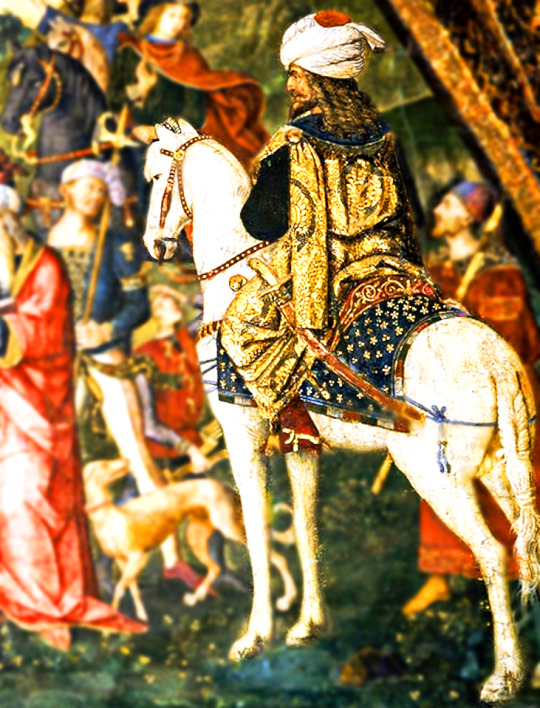
JUAN BORGIA, 2ND DUKE OF GANDÍA (1476–1497) — Biographical and Fictional Tidbits Masterpost ⚜️
Juan was the second son of Pope Alexander VI (Rodrigo Borgia) and his longtime mistress, Vannozza dei Cattanei. At 14, he inherited the title and estate of Duke of Gandía. When his father became pope, Juan, at just 17, was named Captain-General of the Papal Forces. His life, and especially his mysterious death, has fascinated people for centuries. Scholars often described Juan as strikingly handsome, looking much like his brother Cesare but with lighter hair. Known for his charm and sharp sense of style, he was sometimes seen as arrogant and carefree. Not everyone was critical, though: Giandrea Boccaccio, an ambassador from Ferrara in 1493, called him “naturally gifted,” while Tomaso Tomasi, in his book "Vita del Duca Valentino", described him as “a good and honest man with considerable ability.” Pope Alexander VI deeply favored his children, securing for them powerful roles in the Church and society. Juan, one of his favorites, received noble titles and military commands, setting him apart from Cesare, who was initially pushed into a Church career. The Aragonese chronicler Geronimo Zurita, however, wasn’t impressed, describing Juan as a “spoiled young man. haughty, cruel, and unreasonable,” full of grand ideas. Juan often strolled through Rome in his fine clothes, proud of his appearance. Like his father, he had a strong presence, and rumors swirled that Sancia, his brother Jofrè’s wife, was involved with both Juan and Cesare—a scandal that likely fueled Cesare’s resentment. He's often unjustly represented by biased scholars and showrunners. This post is intended to do justice to the historical figure, without either diminishing or absolving him.
THE SPECULATION SURROUNDING THE BORGIA BROTHERS' BIRTH ORDER: "No exact birth dates are known for Juan and his brother, and Juan was long thought to be Rodrigo Borgia and Vannozza dei Cattanei's eldest son, but modern research agrees that he must have been younger than Cesare. Evidence of this is provided by the tombstone of Vannozza, rediscovered in 1947, in which Giovanni is named as the second-born, and a papal bull from 1493, in which Cesare is described as the elder."
EXCERPTS FROM EMMA LUCAS' BIOGRAPHY:
LUCREZIA'S WEDDING (1493): “Juan and Lucrezia stepped forward to kiss the pope’s foot. They were followed by the ladies who once again passed in single file before the papal throne. A few of the more prominent women remained kneeling by the pope while the others moved to stand by his right. Among the prelates and other male guests at the pope’s left stood Cesare, an insignificant figure in ecclesiastical black who must have resented the stellar role of his younger brother. When all the ladies had kissed the papal foot, the bridegroom stepped forward in his Turkish robe and borrowed gold collar. He and Lucrezia knelt on cushions before the pope, and Alexander’s notary asked them if they were prepared to take one another as man and wife. Although they had never so much as exchanged a word, they both assured the notary that they did so ‘most willingly.’ Their replies were the signal for the bishop of Concordia to kneel beside them and slip the ring given the bride by her bridegroom on the ring finger of her left hand and a second ring on her index finger. During this ceremony, the commander of the papal army held an unsheathed sword over the heads of the newly wedded pair. The sword, a tradition at Renaissance weddings, was supposed to remind the bride of what awaited her should she forget her marriage vows. It was lowered as soon as the rings were in place on her fingers. The bishop then delivered a short sermon on the sacrament of marriage, and the ceremony was over. Juan again took his sister’s arm and led her and the other wedding guests into the Sala Reale, where the pope seated himself on his throne and the rest of the company found places on the cushions scattered on the floor.”
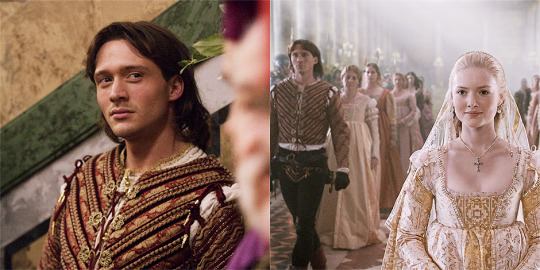
JUAN'S EXTRAVAGANT RETURN TO ROME FROM SPAIN (AFTER GETTING MARRIED), AND THE RUMORS INVOLVING SANCHA: “In August 1496, when Juan Borgia, Duke of Gandía, returned to Rome, it was taken for granted that he, too, must be sharing his sister-in-law’s bed. Alexander’s son, then twenty, had left his pregnant wife and year-old son, Juan II, in Gandía, setting sail for Italy in late July. Shortly before sunset on the evening of August 10, he arrived at the Porta Portese, mounted on a bay horse adorned with golden ornaments and tinkling silver bells. His red velvet cap was embellished with pearls; both the sleeves and front of his brown velvet waistcoat were embroidered with pearls and other precious gems. Those who saw him ride through Trastevere to the Apostolic Palace later found it easy to believe the rumor that this extravagantly dressed youth, with his jaunty air, had brought a ‘magnificent’ young Spanish woman as a gift for his father. However, whether this rumor or the subsequent rumors concerning Juan’s relations with Sancha had any basis in fact remains unknown.”
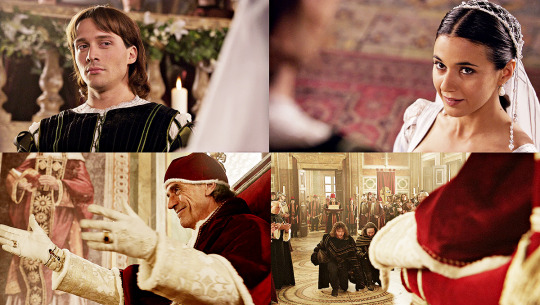
ALEXANDER'S GRIEF FOR JUAN / HIS VOW TO REFORM "Juan had wished to remain in Gandia, but his father had ordered him to return to Rome to lead the campaign against the Orsini. Hence, the pope’s conviction that they had killed his son must have left Alexander with the feeling that he partly was responsible for Juan’s death. In his agony, he saw the loss of his son as God’s way of punishing him for the worldliness of his reign, and he vowed to reform both himself and the church he headed. “We renounce all nepotism,” he told the consistory. “We will begin the reform with ourselves and so proceed through all the ranks of the Church till the whole work is accomplished.”"
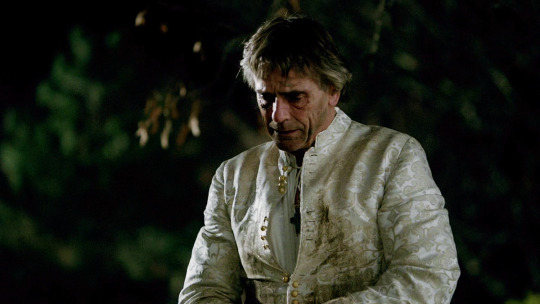
EXCERPTS FROM SAMANTHA MORRIS'' BIOGRAPHY:
SPOILED AND FLAWED: “Juan, who was always seen as Cardinal Borgia’s favourite, was described as incredibly spoiled but also incredibly handsome. His vain and overly self-indulgent character would only lead him to a sticky end later in life. He was later given the position of Gonfalonier—a military and political office in which the chosen individual would head the Papal armies—of the Church.”
JUAN'S TURKISH FLAIR / FRIENDSHIP WITH DJEM: “The young Duke of Gandía seemed to enjoy dressing up in Turkish clothing and going on jaunts with Prince Djem, a prisoner of the Vatican since he had been defeated by his brother, Sultan Bayezid, in a war of succession. Djem had been a prisoner since 1489, with a substantial bribe of 40,000 ducats per year to keep him confined in comfort.”
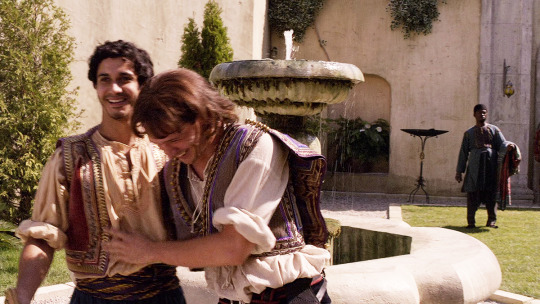
JUAN'S DAZZLING ARRIVAL IN ROME: “Juan returned to Rome in August 1496, leaving his pregnant wife, Maria, behind in Spain. Met at the Porta Portese by Cesare, it was evident that the 20-year-old Duke of Gandía had not outgrown his penchant for flamboyant clothing—in fact, he embraced ostentation in every form. He arrived in Rome dressed in a scarlet cap adorned with pearls, a brown velvet doublet encrusted with jewels, black stockings embroidered in gold with the sigil of Gandía, and a Turkish mantle of gold brocade. Even his horse was adorned with gold and jewels.”
JUAN & CESARE'S ROLES IN THEIR FATHER'S PLANS: “Both brothers knew they had their parts to play in their father’s plans. Unfortunately for Cesare, Juan was the center of Alexander VI’s military plans, which was precisely why he had been called back from Spain. For Cesare, his father was paving the way for a grand ecclesiastical career that would likely culminate in the papacy.”
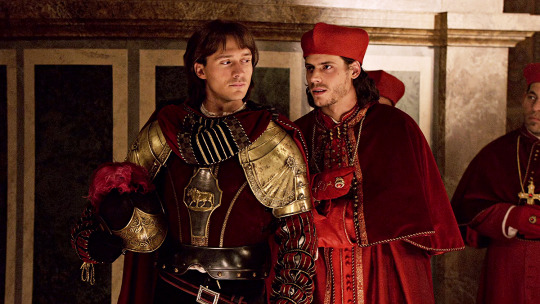
EXCERPTS FROM CHRISTOPHER HIBBERT'S BIOGRAPHY:
SWAGGER & SIBLING RIVALRY: “[Juan] could be seen swaggering about Rome in his gorgeous attire, excessively proud of his figure. Like his father, he possessed considerable sex appeal—it was widely rumored that Sancia gave her favors to both her husband’s brothers, further aggravating Cesare’s animosity. Cesare’s dislike of his brother intensified when Juan, though wholly unsuited to such a position, was chosen by Alexander VI as second-in-command to Guidobaldo da Montefeltro, Duke of Urbino and Captain General of the papal armies, which the Pope intended to deploy against the Orsini, a troublesome family who had sided with the French in their recent campaign in Italy and now controlled much of the Roman Campagna north and south of the city.”
THE NIGHT JUAN DISAPPEARED: “On Wednesday, June 14, 1497,” Johannes Burchard recorded, “Cardinal Cesare Borgia and Don Juan Borgia, Duke of Gandía, both dear sons of His Holiness, had supper with Donna Vannozza, their mother, and some other guests, at her villa near the church of San Pietro in Vincoli. After the meal, as night approached, the Cardinal suggested to his brother, the Duke, that they return to the Vatican; and so they mounted their horses and left with only one or two servants. They rode together almost to Cardinal Ascanio Sforza’s palace, built by His Holiness when he was vice-chancellor. At this point, the Duke told his brother he wished to pursue further pleasure before returning to the palace. Juan left his brother, dismissing all but a footman and a mysterious masked man who had joined him during the supper at his mother’s and had visited him at the Vatican nearly every day for the past month. Juan made room for this masked man to ride behind him on his mule, and they rode to the Piazza degli Ebrei, where Juan instructed the footman to wait an hour and then, if he had not returned, to go back to the Vatican. Soon afterward, the footman was attacked and gravely wounded. Found in a pool of blood, he was dragged into a nearby house, whose owner, too frightened to report the incident until the next morning, discovered the man dead. By now, Juan’s disappearance caused consternation at the Vatican Palace. Alexander VI hoped he had spent the night with a woman and wished to avoid being seen leaving her house in daylight. But as the Pope waited, his anxiety grew. He made urgent inquiries in the area where Juan was last seen. A timber merchant, who watched his wood unloaded from boats in the Tiber near the hospital of San Girolamo degli Schiavoni, reported that around midnight, he saw two men scout the riverbank, likely checking if the coast was clear. Soon after, two others approached stealthily, joined by a man on a white horse carrying what appeared to be a corpse. The group moved along the riverbank, stopping past a sewage dump. The body was pulled from the horse and thrown into the Tiber. The rider asked if it had sunk; assured it had, he noticed the corpse’s cloak floating and threw stones until it vanished. The five men then departed together. The merchant, questioned why he hadn’t reported this earlier, said he had seen at least a hundred bodies dumped there and thought little of it. Fishermen and boatmen dragged the riverbed and found Juan’s body, fully dressed, with a purse containing 30 ducats tucked into his belt. He had been stabbed repeatedly in his body, legs, and head. The corpse was taken to Castel Sant’Angelo, stripped, washed, and dressed in military uniform, then carried to the Church of Santa Maria del Popolo in a procession led by over one hundred torchbearers, ecclesiastics, and members of Juan’s household, all ‘weeping and wailing and in considerable disorder,’ Burchard noted. Alexander VI was distraught, ‘shutting himself away in grief and anguish, weeping most bitterly… From Wednesday evening until Saturday morning, he ate and drank nothing, and from Thursday morning to Sunday, he was quiet for no minute of any hour.’On Monday, June 19, the Pope announced at a special consistory: ‘The Duke of Gandía is dead. A greater calamity could not have befallen us, for we bore him unbounded affection. Life has lost all interest for us. It must be that God punishes us for our sins, for the Duke has done nothing to deserve so terrible a fate.’Recovering from his grief, the Pope vowed to reform the Curia, declaring, ‘We are resolved to think of the Church first, not ourselves or our privileges,’ and promising to ‘begin by reforming ourselves.’ He established a commission that issued a critical report on the Curia’s corruption. Yet, his zeal faded; after arresting Bartolomé Flores Morales, Archbishop of Cosenza, Alexander seized the official’s fortune and abandoned the reform program.”
JUAN'S NEPHEW / LUCREZIA'S BABY: "On March 15, 1498, according to the reports of the Ferrarese ambassador in Venice, [Lucrezia] gave birth to a boy who was christened Giovanni (Juan), in memory of her beloved brother, the murdered Duke of Gandía. The official bull declared that the child, delicately described therein as 'the Roman infant' (infans Romanus)."
VANNOZZA'S BURIAL NEXT TO JUAN: "Vannozza breathed her last at Rome, 26 November 1518, at the age of seventy-six. She was buried with conspicuous honours 'almost like a Cardinal' in the Church of Santa Maria del Popolo, near her son, the Duke of Gandia." "Interior of the Church of Santa Maria del Popolo, Rome. Juan Borgia was buried here following his murder in 1497, and his mother Vannozza was buried close by. There is no trace nowadays of their final resting place within the Church."
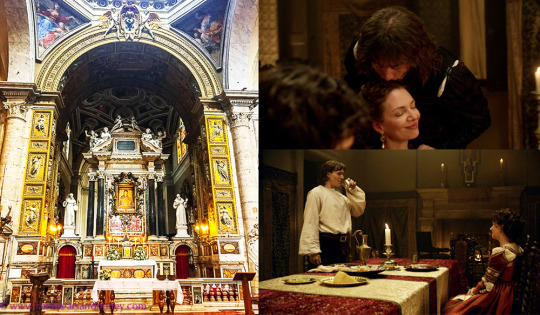
EXCERPTS FROM SARAH BRADFORD'S BIOGRAPHY:
FAREWELL TO JUAN / RODRIGO'S GRIEF: “Juan’s body was taken to Castel Sant’Angelo, where it was washed and dressed in brocade adorned with the insignia of Captain General of the Church. At six o’clock that evening, it was borne by noblemen of the Duke of Gandía’s household in a procession from Sant’Angelo to the church of Santa Maria del Popolo for burial in the family chapel, led by twelve torchbearers, palace clerics, papal chamberlains, and squires, ‘all marching along, weeping and wailing and in considerable disorder,’ as Johannes Burchard commented. ‘The body was borne on a magnificent bier so that all could see it, and it seemed that the Duke were not dead but sleeping,’ he recorded, while another observer remarked that Juan looked ‘almost more handsome than when he was alive.’ An elegant funeral oration was delivered for the Duke by the humanist Tommaso Inghirami, known as Fedra. Alexander’s grief for his beloved son was indescribable; even the stolid and normally unsympathetic Burchard was moved:‘The Pope, when he heard that the Duke had been killed and flung into the river like dung, was thrown into a paroxysm of grief, and for the pain and bitterness of his heart shut himself in his room and wept most bitterly. Cardinal Segorbe (Bartolomé Martí, a cousin of Rodrigo) and some of his servants went to the door, persuading him to open it, which he did only after many hours. The Pope neither ate nor drank anything from Wednesday evening until the following Saturday, nor from Thursday morning to Sunday did he know a moment’s peace.’By Monday, June 19, Alexander had recovered sufficiently to hold a public consistory, where he spoke of his son’s death in emotional terms: ‘The Duke of Gandía is dead. His death has given us the greatest sorrow, and no greater pain than this could we suffer, because we loved him above all things and esteemed not more the papacy nor anything else. Rather, had we seven papacies, we would give them all to have the Duke alive again. God has done this perhaps for some sin of ours, and not because he deserved such a cruel death; nor do we know who killed him and threw him into the Tiber.’”
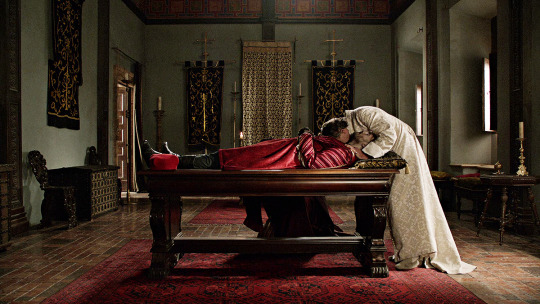
JUAN'S SHADOW HAUNTING CESARE IN 1500: “For the moment, however, Cesare could do nothing to further his plans; in that spring of 1500 everything turned on the outcome of events in Milan, where the French under Trivulzio were locked in a struggle for Lombardy with Ludovico, who had returned to his capital in triumph on 5 February. This forced inactivity seems to have thrown Cesare into one of those fits of nervous, almost superstitious, depression which tended to afflict him at such periods. He had presentiments of an early violent death, perhaps brought on by the prospect of his approaching investiture as Gonfalonier, which raised the spectre of his murdered brother Juan, invested with the same insignia only four years before.”
EXCERPTS FROM PAUL STRATHERN'S BIOGRAPHY:
JUAN'S PROMINENCE / CESARE'S ENVY: “At this point, the editor of Burchard’s diaries, Geoffrey Parker, interjects the telling point that: ‘As only an ecclesiastic, Cesare had very definitely a secondary rank at this wedding, where his brother Don Juan was the leading figure.’ He also mentions how other diplomats observed that Cesare was hardly noticeable amongst all the cardinals and clergy, ‘and was necessarily far outshone by his younger brother.’ There was no doubt that Cesare felt himself humiliated, and ‘jealous of Juan’s rank and opportunities.’ The ceremonies continued: ‘When all the ladies had kissed the Pope’s foot, Don Juan with Donna Lucrezia on his left, knelt on two cushions before the Pope.’”
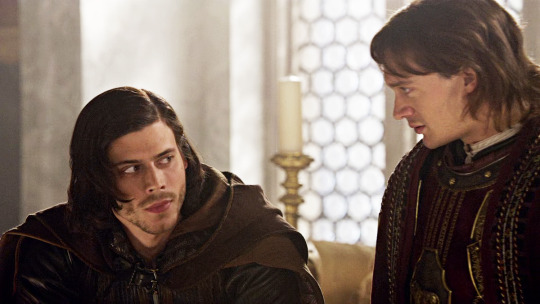
EXCERPTS FROM RAFAEL SABATINI'S BIOGRAPHY:
THE ARAGONESE CHRONICLER'S OPINION ON JUAN: “Juan, ‘the spoilt boy’ as the Aragonese chronicler Zurita described him, seems to have resembled Cesare in looks, though his hair was lighter in color. Handsome, vain, and self-indulgent, he lacked Cesare’s intelligence and self-control. As he grew up, observers remarked on the arrogance that was to earn him dangerous enemies.”
EXCERPTS FROM E.R CHAMBERLIN'S BIOGRAPHY:
JUAN'S EXOTIC FRIEND: SULTAN DJEM: “It was perhaps typical of Juan that he should make a friend of Djem Sultan, the brother of Sultan Bayezid II. Djem was now part guest, part hostage of Alexander, because Bayezid paid a very useful forty thousand ducats annually into the papal coffers as long as Djem, a potential rival, was kept in Rome safely out of the way. He both fascinated and horrified the Romans:‘The appearance of this barbarian prince is fierce and cruel, his body is well-knit and strongly built. He is above medium height, has one defective eye, and a head which is never still as he gazes threateningly around. If this venomous serpent breaks his bonds and escapes from the cage in which Christians have secured him, alas—what destruction and wounds he will inflict upon us if only he have power.’At thirty, Djem was nearly twice Juan’s age and exerted an extraordinary influence over him. Romans had double cause for scandal, witnessing the seventeen-year-old son of the Pope, dressed in an oriental turban, robes, and slippers, with a large curved dagger at his belt, walking arm-in-arm with the brother of the Grand Turk, the implacable enemy of Christendom. No one, however, was unwise enough to complain to the pontiff. The execution of Sforza’s wretched guest had shown clearly the limits of Alexander’s tolerance.”
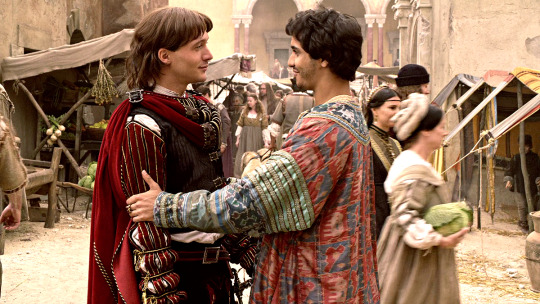
JUAN'S MURDER AS A TURNING POINT FOR CESARE: “The murder of Juan, Duke of Gandía, Duke of Benevento, Lord of Terracina and Pontecorvo, Gonfalonier of Holy Church, might have been designed as a key scene by a master dramatist, for it contained within it all the contradictory elements that were to make the Borgia story one of the great legends of Europe. The murder occurred at the precise moment needed to free Cesare and place him on his desired path, yet it is impossible to prove his responsibility. Details of the murder were subjected to an immediate and lasting blaze of publicity, yet its origins remain rooted in impenetrable obscurity. Its motives can be ascribed equally to political, sexual, dynastic, or frankly personal hatred. Persons closest remained silent, those more distant evolved their own explanations to account for the contradictions, and out of those contortions arose a legend that fatally besmirched the moral character of the entire family, even while it gave Cesare almost superhuman stature.”
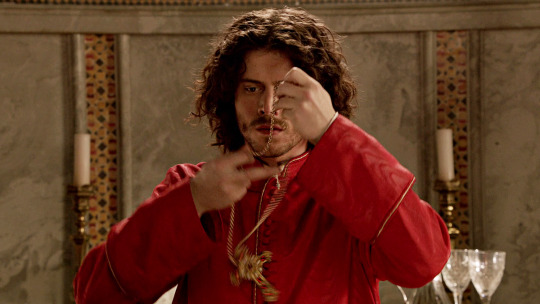
ALEXANDER'S HEARTBROKEN REVELATION: “The manner in which Alexander unbared his soul to the apprehensive College of Cardinals, lacerating himself, gave the clearest possible evidence of the reason why he had so favored Juan: he loved his son with a fierce, all-consuming love. His speech also provided posterity with a brief and almost uniquely undistorted insight into the true character of the man himself. All other actions of Alexander can be shown as simply the product of a ravenous worldly ambition; his desire to reform both the Church and himself could spring from no other source but spiritual remorse. The immense psychic shock of Juan’s death opened his eyes, if briefly, to what he had become, and his reaction was on a typically extravagant scale. It could not last. It was impossible for a man of sixty-seven not merely to abandon the habits of thought of a lifetime but to extricate himself from a situation that he had inherited with the tiara. But it showed that the spirit behind the splendid presence was not entirely atrophied, that under different circumstances he could have been a different man, and that it would not have been wholly blasphemous or ludicrous to predict that the Borgia family would, a generation later, give a saint to the Roman Church.”
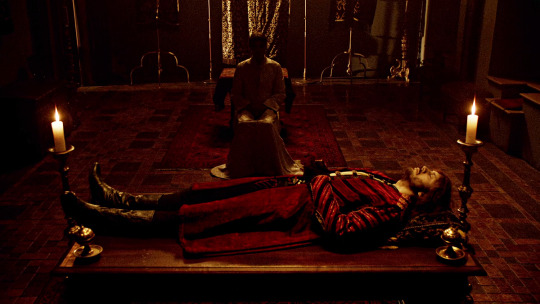
LUCREZIA'S SIBLING BONDS / BORGIA ENIGMA: “It was only in Lucrezia’s relationship with her brothers that there is some ambiguity, something to give color to, if not make credible, the charge of an illicit relationship. As far as Juan Borgia was concerned, that relationship undoubtedly sprang from nothing more than the powerful Spanish bond of blood, raised to a potent degree by the hero-worship any normal young girl would hold for a glamorous older brother. But an analysis of the attraction that Cesare held for Lucrezia leads straight into the very heart of the Borgia enigma.”
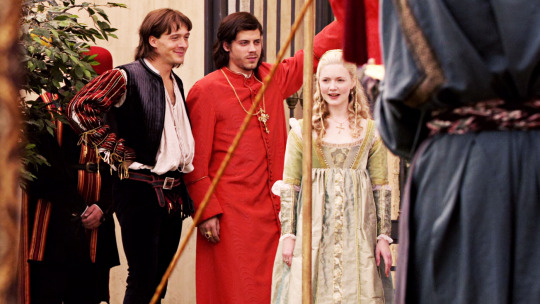
LUCREZIA'S GRIEF AND A SHATTERED PLAN: “In June occurred the murder of her brother Juan, which struck her with particular force. Not only was she attached to the handsome young braggart, there had also been a scheme for Juan to take her with him when he returned to Spain, that magical land which loomed so large in the Borgia consciousness. Had she been taken out of Rome’s festering atmosphere, her entire life probably would have changed.”
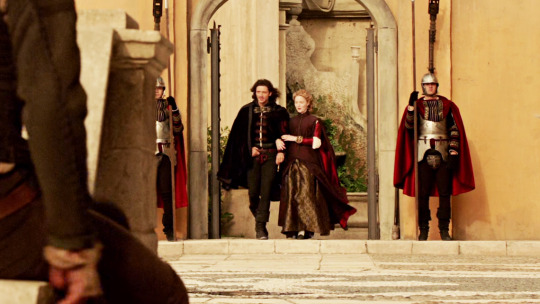
DELLA ROVERE'S CONDOLENCE LETTER TO RODRIGO REGARDING JUAN'S DEATH: “Della Rovere had made the first move toward a reconciliation. At Juan’s death he wrote a condoling letter to the shattered father. Alexander accepted the gesture; he may, perhaps, have been unusually vulnerable during the terrible days following the murder, but he was also well aware of Della Rovere’s high standing at the court of France. Fulsome letters passed between the two, and out of them arose Della Rovere’s appointment as papal legate to the court.”
GUICCIARDINI'S ACCUSATION OF CESARE'S FRATRICIDE: “Guicciardini summarizes Alexander’s hopes and plans for Juan, and then goes on to describe how Cesare, filled with hatred and jealousy of his brother ‘and besides, at his having a greater share in the affection of Madonna Lucrezia, their common sister, incited by lust and ambitions—powerful incentives to the commission of any shocking piece of villainy’ planned the murder of Juan.”
EXCERPTS FROM CARLO BEUF'S BIOGRAPHY:
ACCUSATIONS AGAINST CESARE FOR JUAN'S MURDER: “In a relazione—a report—delivered to the Council in Venice on 28 September 1500, Paolo Capello declared: ‘He [Cesare] killed his brother the Duke of Gandía and had him thrown into the Tiber.’ Capello had been appointed by the Republic orator to Rome at the end of May 1499, two years after the murder.Machiavelli, always a wary historian and an admirer of Cesare, repeated with variations: ‘…About the middle of the month the Duke of Gandía died. At that moment they did not know by whose hand; later it was held as sure that the murder had been committed by the Cardinal of Valencia, or by his command, because of envy or because of Madonna Lucrezia.’Also Guicciardini, a great historian but a bitter enemy of the Borgias: ‘…[Cesare] caused him [Gandía] to be killed one night as he rode alone in the streets of Rome, casting his body in the river Tiber.’ Sigismondo de’ Conti, secretary to Julius II and author of a ‘History’ of his time, in speaking of Pope Alexander and his family: ‘For quite some time there had been a question as to who had killed Juan, Duke of Gandía. It was suspected that it was Il Valentino [the name by which Cesare was later to be known] because of rivalry in power and that he [Juan] was better loved and the favorite of his father Alexander, whom he resembled in the eyes and in all his features.’”
EXPLORING CESARE'S INCENTIVES FOR MURDER: “First of all, as no one who is not a maniac commits murder without compelling incentives, let us see what, in Cesare’s case, these may have been. The passional motive may be ruled out, although there was a time when it found credence all over Italy and even writers of the caliber of Machiavelli deemed it worth registering. Only unsubstantiated gossip, mostly hatched in Pesaro, suggests that Juan’s relations with Lucrezia were such as to arouse Cesare’s jealousy. Even a superficial knowledge of his amorous life disposes of Sanudo’s hypothesis that Sancha, whose favors both he and Juan enjoyed, may have been the cause of the tragedy. There are other motives, however, that cannot be so lightly set aside.”
CESARE'S TRUE MOTIVES FOR JUAN'S MURDER: “It has been said, as proof of Cesare’s innocence, that he did not derive any advantage from Gandía’s demise, for Gandía’s fiefs, titles, and moneys went, as expected, to the dead man’s son. But to imagine that Cesare might have wished to eliminate Juan merely to appropriate his possessions is grossly to misunderstand Cesare’s character and aims. What he coveted was not Gandía’s principalities and revenues, but his position at the Vatican with all the opportunities it entailed. Once he had this firmly in his hands, revenues and titles could be expected, as they actually did, to pour in upon him as naturally as autumn rains on a field. Besides, it should not be overlooked that Cesare assumed the task of administering the estate in the name of Juan’s son during the latter’s minority, an arrangement certainly not sponsored by the widow, who loathed him with all her heart and openly accused him of being her husband’s murderer.”
EXCERPTS FROM ARNOLD H. MATTHEW'S BIOGRAPHY:
JUAN'S RISE AND SPLENDOR IN RENAISSANCE ROME: “This Juan (Don Giovanni) was Rodrigo’s second son, born in 1474. At the time of his father’s promotion to the Papal See, he was already in a wealthy and influential position. When the news of the election reached him, he journeyed to Rome to join the other members of his family. He originally intended to stay only a short time there and, therefore, sent his wife back to Spain. However, his visit prolonged itself, and on June 12, 1493, he was present at the wedding of his sister Lucrezia with Giovanni Sforza, where he presented her with a goblet worth seventy ducats. On June 16, he went with his brother Cesare to receive the Spanish ambassador. On this occasion, they displayed so much pomp and magnificence that they might have been taken for monarchs. From a letter from the King of Naples appointing him Duke of Sessa and Prince of Teano, it is evident that he tarried in Rome until the beginning of August, when he returned to Spain onboard a Spanish galley laden with valuables on which the Roman goldsmiths had been working for two months. Nothing more is heard of him until August 10, 1496, when he came back to Rome. He made his entry into the capital with great ceremony, accompanied by such as his brother, Cardinal Cesare Borgia, and the papal court.”
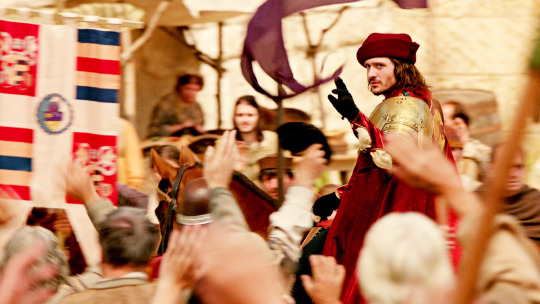
JUAN'S RISE, FALL, AND UNEXPECTED LEGACY: “Soon afterward, the Duke of Gandía was appointed Captain of the Church by the Pope, and, in spite of a conspicuous lack of military ability, on June 7, 1497, he was made Duke of Benevento by the unanimous vote of the College of Cardinals. Tomaso Tomasi represents Juan as a good and honest man of no mean ability; there is little doubt, however, that he led an immoral life, giving himself up to gambling and other, less pardonable, excesses. His father loved him with a fierce, passionate love, and his tragic death, in June 1497, of which we shall hear anon, was a source of deepest sorrow to him. He left two children: Juan, third Duke of Gandía, and a daughter, Isabella, who were piously educated by a saintly mother. Juan married an illegitimate daughter of the Archbishop of Zaragoza, himself a bastard, and, strangely enough, the first child of this alliance—which united so much family iniquity—was Francisco Borgia, fourth Duke of Gandía, who afterward became a saint.”
EXCERPTS FROM GENEVIÈVE CHASTENET BIOGRAPHY:
JUAN'S EXTRAVAGANCE AT LUCREZIA'S WEDDING: “Cesare, Archbishop of Valencia, took his seat to the Pope’s left while Juan remained on the threshold of the room and let his sister advance towards the throne. With her light step and as if moved by an inner dance, Lucrezia seemed not to touch the ground, one could hear only the rustle of her dress and the clink of her jewels. Her gaze full of candor fixed on the Head of the Church, she approached, bowed deeply, brushing her lips against her father’s mule. Juan wears a velvet hat edged with pearls and a brown coat with sleeves embroidered with precious stones, ‘This prince of comedy covered in jewels,’ Burchard ironically relates, nevertheless succeeds in astounding the Romans, who nevertheless know a thing or two about luxury.”
BORGIA MAGNIFICENCE AT LUCREZIA'S WEDDING: “One can imagine Lucrezia casting a delighted glance over all this jubilation, both preoccupied and amused by her role as bride. Amid the provocative vivacity of Giulia Farnese, the true triumphant of the party, the magnificent vigor of her father, the beauty and elegance of her brother Juan Borgia, the mysterious power of fascination exercised by Cesare, her other brother.”
EXCERPTS FROM MARIA BELLONCI'S BIOGRAPHY:
A BELOVED INTERCESSOR: “The culmination of all Alexander VI’s maneuvers was the beautiful Juan, Juan the beloved, the very heart of his father. One could not have had a ‘better or wiser intercessor’ to obtain papal favors, said Vannozza’s husband, Carlo Canale, to the Marquises of Mantua when he requested the gift of horses from the famous Gonzaga stable for the one he called with cheerful nonchalance ‘my son-in-law.’ In dealings with His Holiness you could have no better intercessor than His Lordship, because he is the eye of His Holiness Our Lord. Juan could rightly believe himself destined for a brilliant future.”
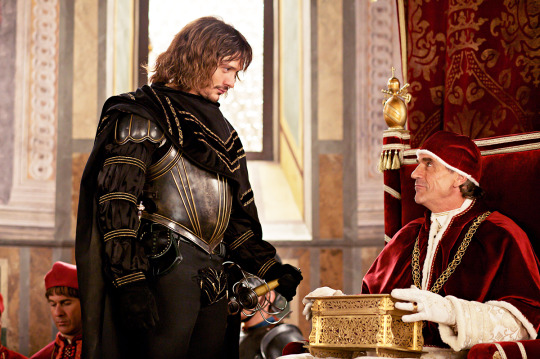
JUAN'S HEDONISM: “Young, handsome, rich, Juan Borgia desired nothing more than to enjoy the advantages offered by life and to spend his time in the company of women who pleased him: courtesans who satisfied his dissolute temperament; severely guarded women or young girls, who excited in him a certain need for adventure and gave him the illusion of having won a battle, the only kind of war he was willing to engage in. He desired anything that could arouse surprise and earn him the admiration of any audience: he was immoderately vain and a great snob. One can therefore imagine how much he found to his taste the most picturesque character then in Rome.”
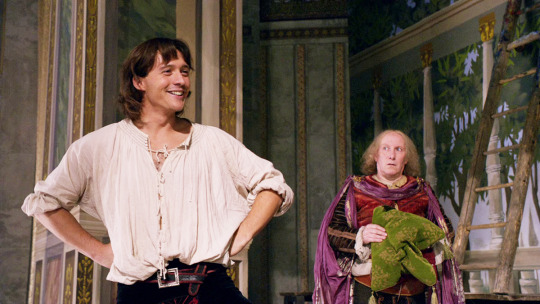
THE RIGHT EYE OF THE POPE: “The culmination of all Alexander VI’s maneuvers was the beautiful Juan, Juan the beloved, the very heart of his father. One could not have had a ‘better or wiser intercessor’ to obtain papal favors, said Vannozza’s husband, Carlo Canale, to the Marquises of Mantua when he requested the gift of horses from the famous Gonzaga stable for the one he called with cheerful nonchalance ‘my son-in-law.’ Juan could rightly believe himself destined for a brilliant future. Juan of Gandía, ‘the right eye of the Pope,’ seemed to all destined to ensure the greatness of the Borgia house.
LUCREZIA'S WEDDING: "One can imagine Lucrezia casting a delighted gaze over all this jubilation, both preoccupied and amused by her role as bride. Between the provocative vivacity of Julia Farnese, the true triumphant of the party, the magnificent vigor of her father, the beauty and elegance of her brother Juan, the mysterious power of fascination exercised by Caesar, her other brother."
JUAN'S WEDDING, THE SCANDAL THAT FOLLOWED, AND HIS PLEA TO HIS FATHER: "Accompanied by the proud and restless wishes of his father, on August 2nd, Juan was leaving: he had not yet arrived in Civitavecchia when a messenger from the Pope reached him, bearing a new list of instructions. Among these was the directive to pay meticulous attention to his appearance: to take care of his complexion and hair, and above all, to wear gloves and not remove them until he reached Barcelona. "The saltiness spoils the skin," explained his far-sighted father, "and in our country, beautiful hands are very important." On August 4th, Juan embarked on one of the four galleys that formed his retinue, and on the 24th, escorted by his advisors and guardians, he landed in Barcelona. There, waiting for him, were his bride and her father, Don Enrico Enriquez, cousin of the king—a "very wise and expert person" who, a few months earlier, in March, had caused a stir regarding the conscience of papal morality. This had prompted Datary Giovanni Lopez to write a curious letter from the Vatican in defense of the Borgia family, denying all "sinister information" and declaring: "Time will give an account of this glorious life."
Convinced—if not entirely, at least sufficiently—Don Enrico now led his sixteen-year-old daughter to meet her groom. Juan arrived looking handsome, smiling, and with his gloved hands full of gifts—truly embodying, for a young girl, the insipid yet adorable dream of Prince Charming. The wedding took place in the days that followed, in Barcelona, in the presence of the King and Queen of Spain and their court. After the ceremony, the newlyweds remained in Barcelona for some time before moving on to Valencia, and later to Gandia. However, pessimistic reports about Juan's behavior soon reached Rome. It seemed that he was so inattentive to his wife that he had not even consummated the marriage, leaving her alone while he wandered at night with reckless companions. Moreover, in just two months, he had squandered two thousand six hundred gold ducats on gambling and riotous activities, and had even attempted to seize the revenues of the duchy.
When this news reached the Pope, one can imagine his offense. He feared, more than anything, the wrath of the King of Spain, who certainly would not have tolerated such contempt from Juan towards a bride of royal blood. Alarmed and ever concerned with the public image of his children, Alexander VI wrote a letter full of stern reproaches to Juan on October 30th from Viterbo. He also instructed Cesare Borgia to write a letter on the same matter, adding a few lines in his own hand to the draft. Additionally, he had the same cardinal write to Don Enrico Enriquez, the bride's father, in a previously unknown letter filled with protests, assurances, and guarantees. Juan promptly replied to his father at length, explaining himself. He admitted feeling some fear of his father's anger, describing this fear as "the greatest anguish I had ever felt." He could not understand how the Pope could have believed "sinister reports written by some malicious people against the truth," when his marriage had, in fact, been consummated. To support his claim, he cited the testimony of the Archbishop of Oristano, Mossen Pertusa, Fira, and other trusted individuals. Furthermore, he reminded the Pope that he had even been informed of the specific day, hour, and minute of the consummation of the sacrament.
As for his night walks, Juan admitted they were true but argued they were harmless. He explained that he had been accompanied by Don Enrico, his father-in-law and a relative of the king, as well as other "knights and honorable people," merely strolling along the coast as was customary in Barcelona. This last statement, with its appeal to the customs of his native land, was intended to sway Rodrigo Borgia's Spanish heart more than any other excuse—it had been included deliberately.
"What worries me," Juan added, "is that Your Excellency has given credence to things that have no semblance of truth." Despite Juan's attempt at portraying himself as a slandered virtuous man, his sincerity failed to convince anyone. Other letters followed between father and son, with the Pope often reproaching and Juan justifying himself. Juan's letters revealed prodigality without grandeur, selfishness, and a superficiality of judgment, in contrast to the indulgent yet discerning attitude of Alexander VI. The Pope, despite his son's repeated assurances, could not remain calm. However, he finally breathed easier in February 1494 when news arrived from Spain that the heir to the Duchy of Gandia was soon to be born. With his doubts dispelled and now confident in Juan's future, Alexander VI turned his attention to providing for his younger son with the same zeal."
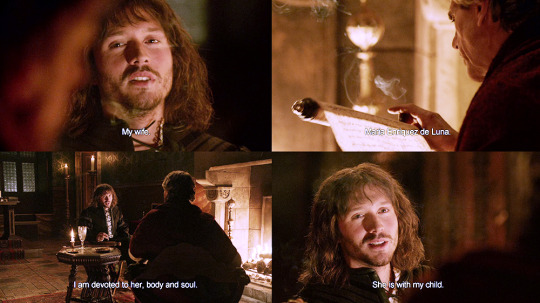
THE SHATTERED DREAM OF JUAN'S PROMISE TO LUCREZIA: “At San Sisto, Lucrezia had learned of the death of Juan certainly with great pain, because she had a passionate attachment to her family. On this elegant and brilliant brother she thought she could count in the future and in all circumstances. It can be supposed—and one will recall Juan’s interest in his sister—that, with the easy benevolence of wealthy and fortunate men toward the women of their own household, Juan had made her great promises to help resolve the vexing problem of her future. Among others, there was the promise, repeated by the chroniclers right after the flight of the Count of Pesaro, to take her with him to the dreamland of the Borgias, Spain. Sudden and cruel death, uncertainty, and isolation had followed all these plans.”
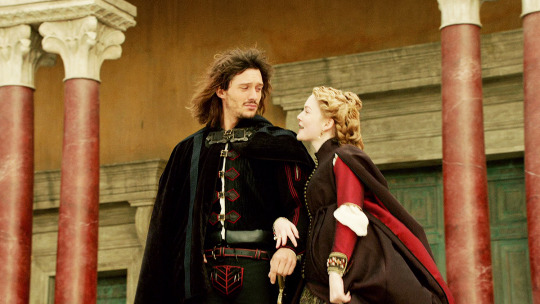
WHAT MACHIAVELLI HAD TO SAY ABOUT "THE PRINCE'S" BROTHER:
“Cesare and his brother Juan were turned into rivals for their sister Lucrezia’s sexual favors. Machiavelli, writing about a year after Juan’s murder, recorded simply that it had taken place and wisely refrained from speculating as to motive. Some years later, however, when he was working his notes into a more permanent form, he altered his cautious statement and gave gossip the status of historical record. ‘At the time it was not known who did it, but later it was said that it was the Cardinal of Valencia [Cesare] who was the author of this murder, either through envy—or on account of Madonna Lucrezia.’ Busy tongues had obviously turned the rivalry of Cesare and Juan for their sister-in-law Sancha into an incestuous rivalry for Lucrezia, and Machiavelli, without troubling to track down the source of his story, added it to the store of Borgia scandal—though with that saving phrase ‘it is said.’ Even now, the story would probably have been dismissed by posterity, for Machiavelli’s works, despite their manifest genius, are as manifestly infused with polemics.”
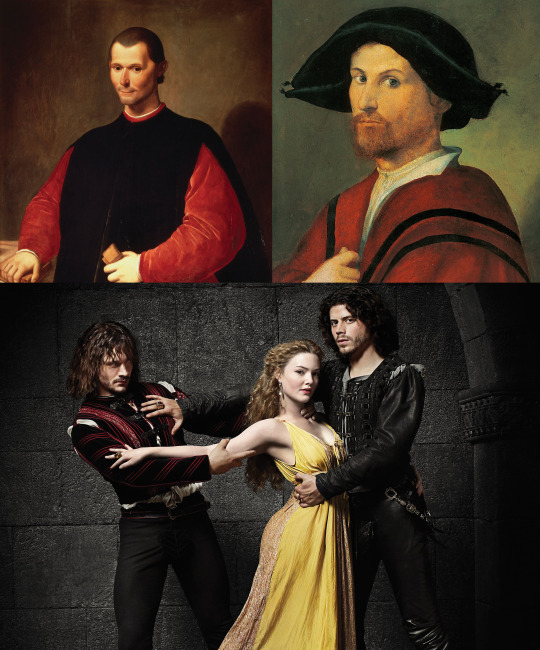
====== HISTORICAL FICTION ======
EXCERPTS FROM MARIO PUZO'S "THE FAMILY":
JUAN'S SPANISH BEAUTY: “Juan Borgia was almost as tall as Cesare, but slighter of build. Like his brother and father, he was an attractive man but with a difference. He had the slightly slanted eyes and high cheekbones of his Spanish ancestors. His skin was bronzed from his long hours of riding and hunting but there was often a look of suspicion in his widely set dark eyes.”

JUAN'S SENSITIVITY, CRUELITY, AND MASK OF DISDAIN: “Juan, on the other hand, was more sensitive to personal injury, though quite insensitive when it came to others. He had a cruel streak, and most of the time wore a sardonic expression. He had none of Lucrezia’s easy grace, and none of the charisma of his older brother. Still, Alexander was very fond of him, sensing in him a vulnerability that Cesare and Lucrezia did not have.”

EXCERPTS FROM SARAH DUNANT'S "BLOOD & BEAUTY":
JUAN'S LION-LIKE VIGOR: “[Juan] is cocky and proud as a young lion. Juan with his mane of red-brown hair and a nose as straight as his own is beaked. Juan, so fresh and smooth that there is almost a girl’s prettiness to his face. But at nearly seventeen, there is nothing feminine in his behavior. Such boundless energy, such outrageous confidence. Where others see vanity, Alexander sees only promise. A young man roaring and chafing at the bit, ready to take on the world. And why not? When did life ever reward those who cowered in its corners?”
====== LETTERS ======
JUAN'S HOMESICK PLEA TO LUCREZIA (1494): “I feel a great desire to have news of you, for it has been a great while since I received a letter from you. You can imagine, my lady sister, what a great joy your letters are to me, for the love I bear you. So, do me the favour of writing for my consolation, because already the Duchess, my wife, complains a great deal of you, that you have never written despite all the letters sent to you from here. She commands us to ask you to write; she is pregnant and in the seventh month. It seems two years since I left. I have written to His Beatitude to order my departure, and from day to day, I hope for this order… I commend myself to the lord of Pesaro, my dear brother, and similarly to Madama Adriana and Madama Julia…”
JUAN'S JOYFUL CONGRATULATIONS TO CESARE (1493): "I cannot say what joy I felt on learning that Our Lord, His Holiness, by his great mercy, created your Reverend Excellency a Cardinal, as I was informed by a brief of His Holiness. This is the news I was hoping for with the greatest desire. Make good use of it, and may it please divine mercy for the salvation of the soul, and prolong the days of His Holiness, with whom we find our consolation, and receive from it many graces. May I see your Reverend Excellency grow, as I desire, all in the service of God and of His Holiness. As for me, I arrived in this city on Thursday, October 10; and being at Puçol, which belongs to your Excellency, three leagues from Valencia, many Valencian knights and lords were already with me. And now, with much love and kindness, they visited me until midnight. I am much grateful, Most Reverend Excellency, for this city and these Valencian lords, who, in truth, are very nice people, magnificent and well-dressed, and of good education. All, by their merit, show me a great deal of love, and they take such care of me that, to prove them right on this point, I cannot be longer than this, except to write that I remain praying with divine mercy to protect your Reverend person, as I wish it. From the obedient brother and son, Duke of Gandia."
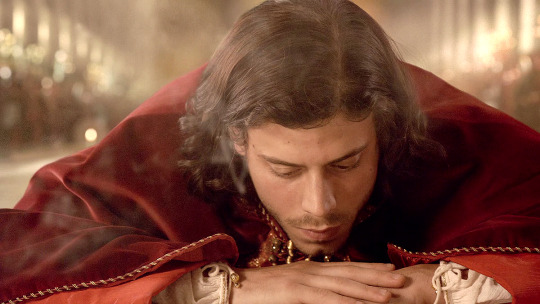
CESARE CELEBRATING JUAN'S RISE/RODRIGO'S TRIUMPH (1493): "For your consolation, I inform you that, thank God, His Holiness, Our Lord, is much better, health restored, joyful, content, and triumphant, especially now that he has come to an agreement, through the intermediary of the Lord Virginio Orsini, with the Majesty of the King of Naples, with immense honor for His Holiness and Your elevation. Indeed, His Holiness, who loves you so dearly and thinks of nothing else but to make you great, has obtained for Your Lordship from said Majesty the most beautiful State in the kingdom, that is to say, the principality of Tricarico and the county of Carinola and Claramonte, which offers 12,000 ducats of income, which I am all the more happy for, for the very great love I have for you. We are quite right, my lord brother, to continually embrace the land that His Holiness treads, and to always pray for the life of he who has elevated us so greatly. Because of that, I ask of you that you continue to serve and please His Holiness, so as to show him gratitude on our part in all we can. This agreement was obtained ten or twelve days ago; and you will be surprised to know I haven’t seen this agreement beforehand, finding myself somewhat ill when such a peace was concluded, one which I constantly intervened in from beginning to end. I left for the baths of Stigliano, where I stayed until last night, having returned healed, by the grace of Our Lord God. During today’s consistory, Most Reverend Lord Cardinal Monreale [Juan de Borja Lanzol] was made legate for Naples, where he will travel over the next six days to crown the King. Shortly after, the illustrious Lord Don Gioffre, our very dear brother, will leave, accompanied by the illustrious Lady Sancia, his wife, with whom will come Lord Virginio [Orsini] and many others. I am sure that he will be received triumphantly, as the letters of His Holiness, Our Lord, will inform Your Lordship with greater detail, to whom I recommend myself, and no less to the illustrious Duchess, my very dear sister. From your brother who loves you as he loves himself, C. Cardinal de Valencia."
SAVONAROLA'S SPIRITUAL CONDOLENCE TO RODRIGO ON JUAN'S DEATH (1497): "Most Blessed Father, after kissing your blessed feet: Faith, supported by innumerable miracles and the divine works of the most famous men, by prophecies as well as arguments and doctrines, and continually strengthened by the blood of countless martyrs, is the one and only true peace and consolation of the human heart. For in that it transcends sense and reason and rests on the divine power and goodness, bearing the soul away to things invisible, it makes us be not in this world and imparts to us a greatness of soul. By it we can not only bear patiently all adversities, but even glory in tribulations. Certainly it is written: “Whatever befalls the just man will not sadden him” [Prov. 12:21]. The just man, indeed, is one who lives in faith, as the Lord attests, Who says: “My just one shall live in his faith” [Abac. 2:4]. Blessed, therefore, is the one who is called by the Lord to this grace of faith, without which no one can have peace, as Isaias says: “There is no peace for the wicked, says the Lord, my God” [Is. 48:22]. And so, let Your Holiness, Most Blessed Father, respond to this, because suddenly “sorrow may be converted into joy” [Joh. 16:20]; for sweet is the Lord, Who in the immeasurableness of His kindness passes over our sins. Every other consolation is trivial and false, because time is short and we transmigrate to eternity; faith alone brings joy from a distant land. What I have heard and seen with my eyes and touched, these things I speak [I Joh. 1:1-3], for the sake of which I willingly suffer persecutions so that I might merit Christ and escape eternal punishment, knowing that “it is terrifying to fall into the hands of the living God” [Heb. 10:31]. Therefore, let Your Blessedness encourage the work of the faith for all men, “on account of which I labor unceasingly even to the point of imprisonment” [II Tim. 2:9], but lend no ear to the impious, and the Lord will give you “the oil of gladness […] in return for the spirit of mourning” [Is. 61:3], for the things which I have prophesied and prophesy are true and from God. “But who has opposed God and had peace?” [Job 9:4] These things, Most Blessed Father, I humbly write to you — a few words to the wise — with charity as my guide, desiring Your Blessedness may be truly and not falsely consoled in the Lord, because “when His anger is enflamed suddenly, blessed are all they who trust in Him” [Ps. 2:12]. And so “may the God of all consolation” [II Cor. 1:3], “Who has led forth from the dead our Lord Jesus Christ, the great Shepherd of sheep,” [Heb. 13:20] in the blood of His everlasting covenant” [Heb. 13:20], “console you in your every tribulation” [II Cor. 1:4]. Farewell. From Florence, the seventh Kalends of July 1497. The son and servant of Your Blessedness, Brother Girolamo Savonarola, of the Order of Preachers, by his own hand."
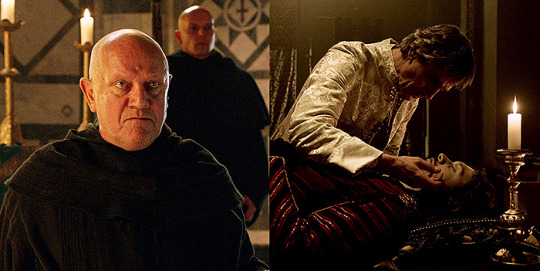
JUAN'S PORTRAYAL BY DAVID OAKES IN "THE BORGIAS":
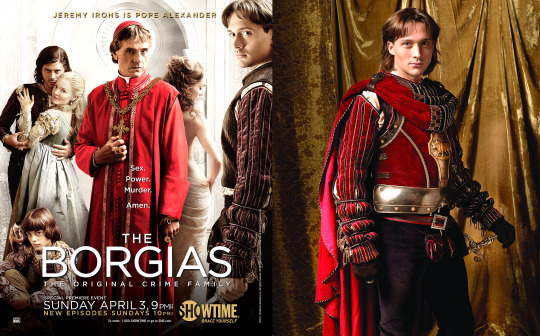
(I picked only Juan's portrayal in Showtime's The Borgias, not only because his portrayal in other media is almost a one-note character, but because Oakes' interpretation of Juan goes beyond the original intent for Juan. He not only gave him depth, humanity, and rich layers, but also made him a very authentic character, despite the narrative attempts to diminish him in favor of Cesare)
JUAN'S FLAIR, FLAWS AND BRAVADO: "There is some question as to whether Rodrigo is actually Juan's father, so he feels constant need to prove he is a real Borgia, Juan has a lot of flair and personality, but he's also perhaps a bit naïve and a little weaker than his brother. That compels him to compensate with bravado, which makes him dangerous." (⚜)
THE LOYAL OUTCAST OF THE BORGIA: "He’s spent the entire time being picked upon and bullied by the family. I think personally from where Juan stands he sees the hypocrisy in the family, how they can do one thing and say another. As far as Juan is concerned he’s always had the best interests of the family at heart, however misguided that might be and doesn’t quite comprehend why nobody understands that. Nobody seems to understand that what he does, he does for the betterment of the Borgia clan and never waivers from that. He does that in ways that perhaps aren’t sanctioned by the church or sanctioned by family law.” (⚜)
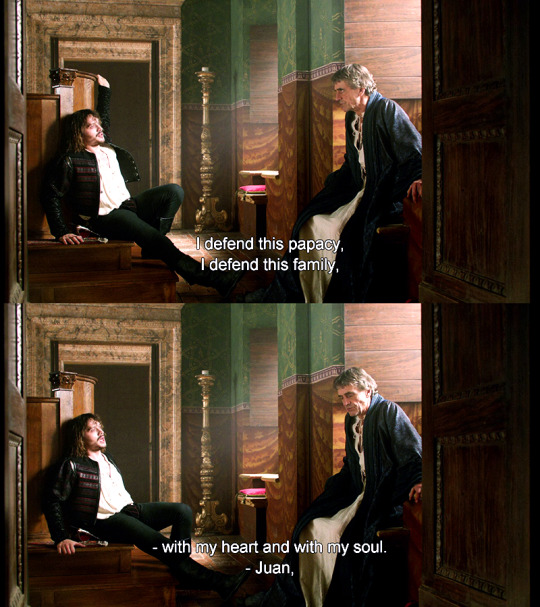
HUMANITY BEHIND ARROGANCE: “You got this wonderful meeting between what [creator] Neil Jordan wanted initially for Juan to be, and what they ended up with having cast me in the role. I don’t try to make him likeable. I try to just make him human. It goes beyond that. I was always trying to show Neil that behind the arrogance and uselessness, there sort of was this true human being that desired to impress people.” (⚜)
HEARTFELT EAGERNESS AND HEROISM: “One thing that I’ve always said about Juan is that every action that he does is heartfelt and genuine. When it was the war against the French, he was there and he was going to go to war, even though he knew he was going to die. He saw them getting ripped apart, but he was there and he was going to do it. I believe if Lucrezia hadn’t come over, he would have led all his troops into death. I don’t think there’s anything that he’s done which was through general cowardice. In terms of his survival, he died how he lived, and that’s laudable, in itself.” (⚜)
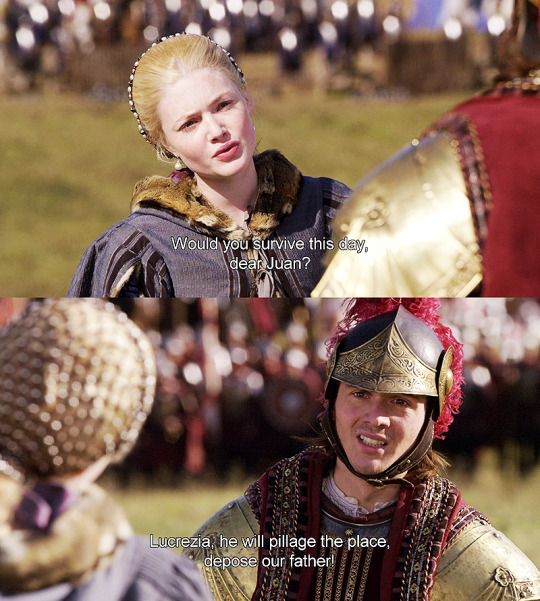
TRAGIC ISOLATION AND YEARNING FOR HIS SIBLINGS: “There’s a great little scene which we shot on the third-from-last day, which is Juan in the opium den scene, looking up at the ceiling with the smoke everywhere, where he says, ‘I think my brother and sister are having congress,’ which is the first time anyone in the entire series—I mean the audience had been thinking that for a while—that something twisted was going on between them. And the fact that Juan is aware of this and concerned by this is quite an interesting one. I don’t think he’s jealous of them being together. I think he’s jealous of not being a part of it as well. When he forgives Cesare at the end, saying how they’re brothers and wants to be together, I think that’s genuine. That’s the first time you realize what he’s always wanted. He just wants to be a part of the family, and at every turn they’ve not allowed him. They’ve always pushed him away, which is a great shame.” (⚜)
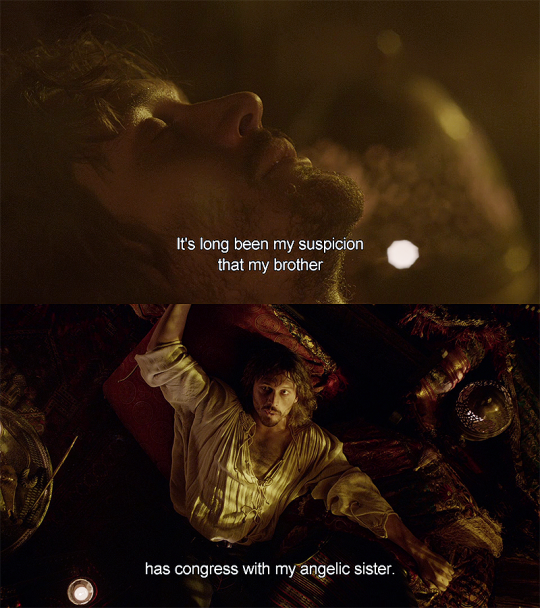
RELENTLESS SOLDIER DOOMED FOR TRAGEDY: “You’ve got this boy. And he is a boy at that stage still. He’s confessing that he’s always been quite miserable and been quite harsh on himself. He’s given them every opportunity to change their mind and see him for what he is. He finally gets things in order. He finally starts to work well. He gets a whole siege together, and it’s working. Then it all turns around because of Cesare. And he gets shot in the leg (laughs). How many times must he try to get something right before someone ruins it for him? He has the worst luck. He never gets a good break. But every now and then, when he gets it right, he still gets it in the end. He does a successful siege. He loses. He apologizes to his brother and gives his heart to him. And he still gets stabbed and thrown off a bridge.” (⚜)
LOVE AND FORGIVENESS VS. HATRED AND FRATRICIDE: “Because of the opium addiction, and because of what he’s saying, and because it’s so heartfelt and emotional—for the majority of that speech, it was quite singularly focused upon him. It was this torrent of thoughts rushing out of him that he’d been wanting to say for such a long time. And then finally, in that hug, everything comes to a head. That was quite moving. But I’m not sure Cesare will reciprocate that. Through all of that walk, he was so rigid and just preparing himself to do it, that he was not really listening to Juan, I thought, on the day—but intentionally, in character. If he had listened to what he was saying, perhaps Cesare would not have gone through with the act of killing his younger brother—especially when they are apologizing for their bad habits and trying to help them become more comfortable with themselves. It gets very close, doesn’t it? It’s interesting that Juan’s attempt at relieving pain is through closeness and hugging and love. Cesare’s attempt to relieve pain is through murder and fratricide—and that’s very interesting. It would have been quite nice to have seen where the character could have gone next. But I think what it certainly sets up is (God knows what will happen in Season Three) the downfall of the family. It will be a very different family without him.” (⚜)
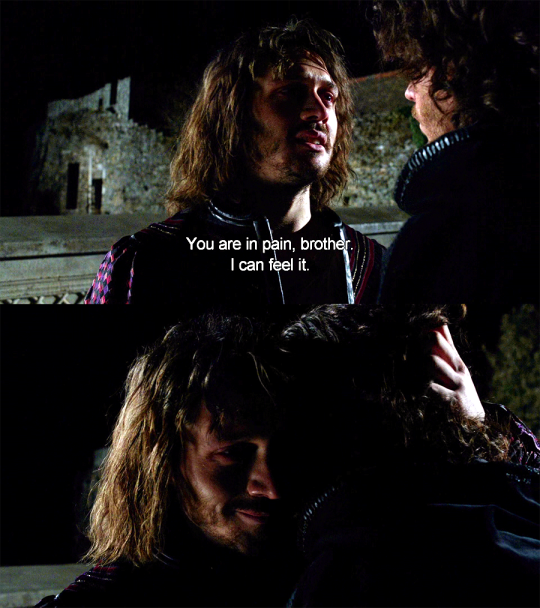
MISGUIDED SOUL SHUNNED BY HIS OWN: “He’s not afraid of dying in that sense. He’s afraid of not being liked or loved and being left by his family. It’s just his entire family, whether they know it or not, has been ganging up on him from the very beginning of the first season. What’s the problem with him? I think he’s lovely. I think he’s really kind and compassionate and cuddly.” (⚜)
THE MISUNDERSTOOD BRUTE WITH A HEART: "He's not a villain, he is misunderstood and wants people to realize that he's actually doing things for the right reasons but by doing that he acts like a child and acts like brute and acts like a bit of a psychopath at times." (⚜)
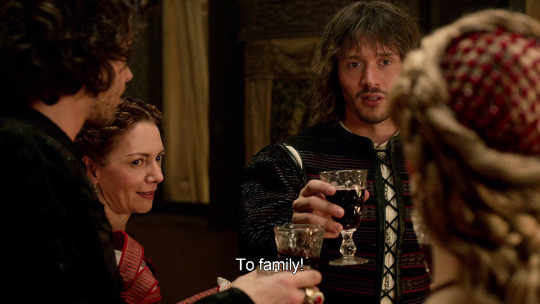
UNFAIRLY VILLAINIZED TO SERVE CESARE'S NARRATIVE: “It’s not nice, leaving a job when you’re not ready to. As far as I was concerned, Juan had just gotten very exciting and was being taken out in his prime, in terms of his character. But it was so bitterly cold. By the time Cesare gets to actually stab him in the stomach a few times, he’s kind of already gone. (laughs) He doesn’t pose much of a threat to anyone… Certainly, with that final episode, they tried to get me to play Juan as villainous as I possibly could—hence the Michael Jackson baby-dangling scene, and the attempted rape scene—to make him seem like a terribly bad person. Cesare always had the writing on his side.” (⚜)
====== JUAN IN WORK OF ART ======
MICHELANGELO'S PIETÀ: A POSSIBLE PORTRAIT OF JUAN BORGIA AND HIS MOTHER, VANNOZZA DEI CATTANEI
MIGUEL ESTEVE'S OUR LADY OF THE ROSARY AND THE MIRACLE OF THE KNIGHT OF COLOGNE: ACCORDING TO THE INTERPRETATION BY ÉMILE BERTAUX, THE PAINTING WAS COMMISSIONED BY MARÍA ENRÍQUEZ DE LUNA, THE WIDOW OF GIOVANNI (JUAN) BORGIA, THE DUKE OF GANDÍA, AND SHOWS THE MURDER OF HER HUSBAND BY HIS BROTHER, CESARE.
LODOVICO PGLIAGHI'S ART OF ALEXANDER VI AND HIS CHILDREN, LUCREZIA AND CESARE BORGIA, LOOKING AT THE CORPSE OF THE DUKE OF GANDÍA BROUGHT TO THE VATICAN. WOODCUT FROM FRANCESCO BERTOLINI: IL RINASCIMENTO E LE SIGNORIE ITALIANE (STORIA GENERALE D'ITALIA, VOL. 2.), PUBLISHED BY TREVES, MILANO, 1897
RETRATO DE HOMBRE" (A MAN ASSUMED TO BE JUAN BORGIA) BY GIROLAMO MARCHESI (1480–1550)
ST. CATHERINE'S DISPUTATION" BY PINTURICCHIO. THE STANDING FIGURE IN PINK IN THE LEFT FOREGROUND, FACING THE SPECTATOR, IS THOUGHT TO BE JUAN BORGIA
46 notes
·
View notes
Photo

[…]It was on the eve of the marriage of Lucrezia Borgia with the son of Duke Alfonso d'Este. The court of Rome and the court of Ferrara were in great celebration. Valentino stood at the height of war fortune. [… ]In those days there is a document of courtesies used by Cesare Borgia to his distant wife. On December 18, 1501, the Senate of the mainland of Venice was called to decide whether to exempt some goods from duty, which Cesare wanted to send as a gift to the his wife. And here’s the interesting and amusing document:
“It was established in our Signoria, to the reverend papal legate and the orator of the Illustrissimo Duca Valentino, permission to grant them from our free city and without any payment of duty, the infrascripted items that are for use of [his] wife. And as one must use all signs of love and benevolence towards said duca, exempting the tax of the aforementioned items, for the information that we have. […]The items are these: - White wax crafted, 1,300 lire - White confetti, 3,000 lire - Fine sugar, 800 lire - Spices of various types of currency 180 ducati - Syrup confection, three cases - Oranges and lemons, number 3,000 - Malvasia, six barrels - Cloths of various types, 20.
Three thousand lire of white confetti, eight hundred lire of “fine sugar”, 180 Ducati, which is about 2,200 lire of spices. […] And the confetti and sugars of Venice were famous: they were so sought after that the Republic, for profit, overcharged them with a good export tax. Cesare had now tried not to pay it. The success was for him, as it appears from the vote at the end of the document.”
Source: Gustavo Sacerdote, Cesare Borgia: la sua vita, la sua famiglia, i suoi tempi.
23 notes
·
View notes
Photo


“In mid-september, between 1474 and 1476, probably the night of 13 to 14 September 1475, it is assumed to have come into the world the son of a woman in her thirties, who has gone down in history as Vannozza Cattanei, and Cardinal Rodrigo Borgia, forty-four years old, Vice-Chancellor of the Church for almost two decades, the highest ecclesiastical authority after the Pope. The pleasant event would have taken place in the town of Subiaco, eighty kilometers from Rome, of whose important abbey the cardinal was the holder, along with other numerous positions. The child was baptized with all intention with the name of César [Cesare], because his father expected from him no less feats than those of that Roman emperor.[…]We are talking about a concrete night and place, but in reality we do not know for sure when and where exactly this child was born.[…]Cesare Borgia will be one of the most famous figures of the Renaissance, but this legendary character whose short thirty-one years of life made him a myth of all time, is a ghostly apparition —in one of the key moments in history— from which almost everything was invented and almost nothing is really known. He will cross his time like a dazzling lightning, leaving behind him an indelible mark of military feats and political intrigues, enlarged by a legend of crimes and cruelty as unfair and exorbitant as that which has overshadowed the history of the whole family. Many of the myths of his life are fantasies, almost always deceitful. He will be known as El Valenciano, Il Valentino, Le Valentinois. Not even his last name is fixed: he is a Borja of origin, but it will be a Borgia for universal history.
- José Catalán Deus, El Príncipe del Renacimiento: Vida y Leyenda de César Borgia, 2008.
34 notes
·
View notes
Text


"I am not a tyrant, as my enemies are saying everywhere, and I do not want other witness than the cities of Romagna, which under my government have begun to discover the tranquility and peace that they had not even dreamed of, nor enjoyed, in the past times." — Cesare Borgia to Guidobaldo da Montefeltro
HAPPY BIRTHDAY CESARE BORGIA (13 September 1475)
228 notes
·
View notes
Note
Why do you think that Cesare helped Della Rovere become Pope? It's seems uncharacteristically...stupid? Perhaps illness and grief had made him desperate?
(Also I can't get that scene of Della Rovere hitting on Cesare in Borgia out of my head help lol)
Oh, thank you anon, for giving me the chance to vent my thoughts about the most frustrating event in Borgian history! This is long-ish, and tumblr is being weird(!!!!!!!) with the read-more link, so I'm not sure where/if it will show up below or not. Before answering your question, there is a question to be made first, I think: Why was Della Rovere still breathing in the year of 1503? If we follow the Borgias’ historical literature, the vast majority paints Rodrigo and Cesare, in particular Cesare, as unscrupulous, utterly ruthelss, vindictive men. They were the terror of Italy, and they meticulously eliminated all of their enemies. Yet, most of their enemies and their families, important to add, lived. Including Della Rovere, the most dangerous and bitterest rival of their family. What are we supposed to make of this? It's another one of those common situations in Borgian bios where what it is said is demonstrably at odds with the historical material, and it's something to ponder, I mean, Cesare only found himself in his predicament in 1503 because he and his father failed to strike down Della Rovere during those long eleven years they were in power. Their inability and/or unwillingness to do so was a graver political mistake than Cesare helping Della Rovere win the papacy in the end. And answering your question now, yes, I think the initial impression is that it does seem uncharacteristically stupid for Cesare to support Della Rovere, and help him win. But then again, I don't think Cesare's biographers are very good in showing the complexity of papal Conclaves, and the whole political landscape Cesare was in, and all the possible factors that came into play in his decision. Maybe it's a decision made not to overwhelm or bore the reader, but it usually has only one or two chapters covering both Conclaves, with a lot being left out or ignored, or simplified. The two most popular opinions are that: 1. Cesare had no choice, but to support Della Rovere. Some claim he was no longer in a powerful position, or felt lost without his father's guidance, and/or Della Rovere was the only and strongest candidate for that Conclave from the start, and his election was an impossible thing to avoid. It was already settled, and Cesare had to roll with it the best he could, and try not to make the future Pope even more hostile towards him. 2. He had other choices, namely he had cardinal Rouen, but in the end it didn't worked out, and Della Rovere stood unopposed as a candidate for the papacy, which forced Cesare to support him, and/or he apparently believed Della Rovere's promises, and thought they could reach an understanding. Opinion #1 is the most messy, and it makes zero sense to me today, given there is actual historical info reporting the contrary. The idea that Cesare's power and influence died out or diminished after his father died, or that he was lost without his guidance, are false. Prior to Della Rovere's election as Pope Giulio II, Cesare's power and influence remained strong. He still had large sums of money with his bankers in Genoa and other places of Italy, he continued to be visited daily by cardinals and orators, and indeed it even seems he was thought to be the decisive factor for any papal election. There isn't much criticism to be made either, when looking at his actions right after Rodrigo died, esp. considering at the same time he was dangerously ill himself, and it wasn't something he had prepared for, being it impossible to predict such a thing, he played all of his cards wise and correctly. He was able to secure Piccolomini as Pope, who if not a Borgia partisan, at least was not antagonistic towards him and his family. About the second Conclave, there is a report from Machiavelli in which he says cardinal Pallavicini was the only one being regarded as a possible rival to Della Rovere. And Burchard, whose info seems to have been correct in this instance, writes of a meeting that took place between Della Rovere and Cesare with the Spaniard cardinals at the Vatican, a variant of this info is of Della Rovere meeting Cesare and the Spaniard cardinals at the Castel Sant' Angelo, where they were able to reach an agreement. Opinion #2 makes a little more sense, and it matches a little bit more with the info there is, but it's still messy. Cardinal Pallavicini is almost never mentioned (only Woodward mentions him iirc), and it has to be said that even if Della Rovere succeeded in making himself an unopposed candidate, nevertheless, the Spanish vote could decide an election. So Cesare still had choices, and the reason why he didn't went with those choices, in my view, is not because he believed Della Rovere's promises, it's not the case of Della Rovere winning in the game of deception, I believe both men were aware that agreement was only temporary, and Cesare's decision there was composed by other factors. And between these two opinions, here's what I think is more plausible to have happened: Cesare, knowing his beloved tutor Giovanni Vera was as impossible a choice in that second Conclave as he had been in the first, thought about supporting the French cardinal Rouen. He was far from the ideal choice, but he was a workable choice for him. However, although his influence with the Spaniard cardinals was strong, he must have been aware his influence with them had limitations. The cardinals would never vote for a French candidate, because they were also obliged to King Ferdinand II of Spain, who also had his influence with them, and whose interests they were there in Rome to protect and represent. So much like Vera, Rouen quickly became an impossible choice for him. After this, it's reasonable to think he turned his efforts towards any candidate who stood a chance against Della Rovere, which turned out to be cardinal Pallavicini. Pallavicini is interesting, because like Della Rovere, he was also from the Liguria region (Genoa), but unlike Della Rovere, he maintained a friendly relationship with the Borgia family during Alexander VI's papacy. Rodrigo Borgia was able to secure his support during his own battle to win the papacy in the Conclave of 1492. He also counted on this cardinal's efforts when trying to nominate Cesare for the cardinalate. And he appointed him Bishop of Pamplona, a title previously held by Cesare himself. There is nothing, that I've found anyways, suggesting he and Cesare had direct interactions, but it's possible Cesare cultivated a relationship with him much in the same way he did with cardinal Piccolomini (later Pope Pius III). So by all accounts, Pallavicini was Cesare's best choice then, and it is intriguing there isn't much about this, or why Pallavicini failed to make himself Pope. In theory at least, with Cesare's support, he would have won the papacy. The Italian cardinals were not supporting Della Rovere because they wanted him, many disliked him, some still remembered the papacy of his uncle, but he seemed like a better choice than another Spaniard, or a French, or god forbid a Colonna or an Orsini, but with cardinal Pallavicini, they had a good choice there, and the only reason I can think of as to why they didn't elect him comes down to money and benefices. At some point, Pallavicini, even with Cesare's support, couldn't keep up with the resources Della Rovere made sure of having, and just like Rouen, he fell behind. From this point forward, things get more complicated for Cesare, but Della Rovere's election was still not a concluded reality. A question that follows when reading the info about him meeting with Cesare is: Would he have reached out to Cesare, the son of a man he hated to the core, from a family he despised, if his election was such a sure thing? I think the answer here is no. Della Rovere entering into an agreement with Cesare highly implies, if not proves it, he did not had the necessary votes to win. He needed the Spanish vote, 11 votes to be precise, which were under the influence of Cesare. Without the 11 votes, every single voting would end up nowhere, and a thought I believe was on Della Rovere's mind at the time was that: the longer it took for an election, the more difficult it became for him to stay as strong and unopposed. The support he had could shift in one week or two. New rivals could emerge, unexpected things could happen, because papal Conclaves were mostly unpredictable. It depended a lot on money, influence, the political situation on a daily basis, esp. in Rome, where as it was the norm without a Pope, was a city under total chaos. Della Rovere could only control so much for so long, and I think he knew that very well, hence why he swallowed his hatred, and went to negociate with the son of his archenemy, and get the 11 votes he needed to win as soon as possible.
Another question that follows after reading all this is: Ok, so why didn't Cesare used that for his advantage? better yet, why didn't he use the chaos in Rome, for example, to subtly force the cardinals to stop supporting Della Rovere and find a more favourable candidate for him? Or why didn't he simply stalled the election until a more favourable candidate appeared? These are all things he was in a position of doing, and the reason why he didn't do it, and instead went with helping Della Rovere can be better explained when considering the following factors: 1. You mentioned his grief, and his illness, which might have made him desperate, and while I don't think it was that exactly that made him desperate, I do think it counts as a factor into understanding his state of mind at that moment, and why he made that final decision. Cesare had gone through a rollercoster of events, and dare I say, emotions in less than 3 months. He lost his father, the constant and closest male presence in his life, as far as we know. He didn't had time to grieve him nor make sure he had a decent and respectful burial (it's possible he heard later what was said about his death and burial, and I have no idea how that made him feel) because he was also fighting for his life then. First against illness, then against his enemies in Rome. Not only that, other people and things depended on him. He was the head of the house then, and it fell to him the responsibility, among all that chaos, to keep the women and children of his family safe, as well as to make sure to get all the valuable possessions left in the Vatican and in his palace, before they were sacked completely by servants and others. This was an important step to ensure their survival in the coming months. Gioffre was there to help him, and he did helped, but you know, everyone looked at Cesare for leadership and protection, and he could barely leave his bed, so that surely must have added an extra layer of stress for him. But then, he succeeded in making Piccolomini pope, and it looked like the worst was over, things looked hopeful for him and the Borgia family. And then, suddenly Pius dies, only after 26 days of papacy. Again, if it was truly a natural death, there is no way Cesare could have predicted that, and just like that he was right back where he started. Having to navigate the messy political affairs of a papal conclave and its outcome, of which he and his family’s lives and future depended on. Cesare was resilient. Rodrigo raised his children to be resilient, and to not crumble at the face of adversity, to persist. But I guess we can agree this a lot for a person to process in such a short amount of time. So by the time the second Conclave happened, it would be reasonable to think Cesare might have been feeling overwhelmed, tired, in pain (he had gone through awful treatments), and overall just a bit shaken up mentally and emotionally, although he always tried to look strong and positive —it's interesting to notice it didn't seemed to have been in his nature to be a pessimist, only much later he is recorded as feeling more despondent, and saying Fortuna has left him *gets sad in spanish* — which made him more open to consider options he wouldn't have had under normal circumstances, I think. 2. As said above, Cesare seems to have had this trait in his personality of being resilient, it's one of the reasons why I think he survived for as long as he did (same with Lucrezia, I suppose), he had an instinct to not give up no matter how impossible the situation looked, of not being afraid to face adversities that came his way. He seems to have welcomed challenges, and it was when he felt most encouraged to fight and to thrive. When he was the prisoner of Della Rovere in the Vatican, then pope Giulio II, one of Giulio's men said to him: "signor duca, you have always been spirited." to which he is recorded as having said that: "quando più sono in adversità tanto più mi fortifico di anima. // the more I am in adversity, the more I strengthen my soul." So this is another factor to consider. It's possible he saw the situation with Della Rovere as just another adversity he had to face, and with his tenacity, intelligence, and most importantly, with time, he could overcome it. 3. Another possible factor, but this one is only my personal assessment after reading Alvisi and some of the documents he exposes there, is that both Rodrigo and Cesare display a difficulty in understanding not everyone was as cold-headed and pragmatic as they were. It's evident in their actions, they never had much, if any, trouble putting their personal dislikes aside, and working with their enemies, if it meant they would reach a certain goal they wanted, and/or if it avoided needless conflict or bloodshed. However, not everyone is capable of rising above their feelings, and in this case prejudices, and work like that with people they see as enemies. It was the case of Florence and Venice, for example. Every single conversation the Borgia men had with these two city-States made it painfully clear no agreement would ever happened between them. They would much rather damned themselves and their cities than to genuinely try to work with men they suspected of being marranos and who they saw as being beneath them. It was personal, deeply personal, and to a point just irrational, too. But Rodrigo and Cesare did not seemed to grasp that, like the idea of acting against one's own interest simply out of personal dislike or prejudice didn't register inside their minds, it was just preposterous to them (I agree! dsdjsdjsj). With the right terms, surely an agreement can be reached, no matter how they feel about us, that's what they seem to think, and it's a bit funny, and sad to observe. And if I'm correct here, then Cesare helping Della Rovere might have carried some of this mentality, too. Him thinking: yes, of course, Della Rovere hates me and my family, but not to his own detriment, right? (wrong, just as like in the cases of Venice and Florence, but he later learned that the hard way) and this thinking made him conclude they could work together, despite of any hatred. 4. And finally, the last factor, which I see it as the final nail the coffin, sort-to-speak: His impatience. In the middle of all this papal business, and him fighting for his life, Cesare was also receiving daily news from the Romagna, and after Pope Pius's death, the situation went from bad to worse, his dukedom was being attacked by the men he had ousted from those cities (instead of having had them executed, as it was the norm of his times) with the full support of Venice and Florence in doing so, and only a few cities, like Cesena, were able to withstand these attacks. This is what I think made him desperate. We have to keep in mind Cesare was a man of action. Sitting idle watching his project, one that seems to have been dear to him beyond just mere ambition, wasn't how he did things, and it had to be pure agony for him to be in a position where he couldn't do much. He was still ill, he couldn't organize his men well, he was pretty much trapped at the Castel Sant'Angelo since the one time he tried to leave Rome, the Orsinis almost caught him, and if they caught him, he was a dead man, him and everyone with him. And he didn't had papal authority, only with that would the attack of these cities stop and only with that could he leave Castel Sant'Angelo and finally do something, so he needed a Pope elected as soon as possible, too, even one like Della Rovere. This hurry, this agony, combined with the other factors mentioned above, very likely might have made him overlook some details about his particular situation, misunderstanding Della Rovere’s nature, and underestimating this man’s hatred for him and his family.
Personally, I believe he should have stalled the Conclave for as long as possible, and waited a more favourable papal outcome for him. Sure, it involved other risks. The main one losing all of the Romagna, but here's the thing: the Romagna was basically lost to him anyways. That region belonged to the Church and to papal rule, and Cesare's control over it came from his position as Gonfaloniere of the Church, but imo, that wasn't a position he could have kept. Popes tended to appoint this position to men close to them, family members preferably, because it was an important and influential position, and they needed someone they could trust, and whose interestes would be aligned with them and their papacy. Maybe there is a precedent of a Pope letting the son of the previous Pope in this position, instead of changing it for someone inside their own circle, and nothing bad happened either lol, but no example comes to my mind right now. And in any case, I don't think they were quite in the same situation as Cesare. Cesare's situation was kind of unique, too. He was a beloved and popular ruler, and this little fact, whether he realized it or not, made him even more of a threat to any Pope who wanted to have full control over the Papal States. It created a conflict of power where the Gonfaloniere's influence in the Romagna would have been stronger than that of the Pope himself, which could lead to dangerous situations. With a decent amount of money, the right partisans, and the people's support (who always had anti-papal feelings to being with) Cesare, if he wanted to, could very easily strike up a rebellion against papal authority. No clever Pope, surely not Della Rovere, would have wanted to have that hanging over their heads. That's way too much power for a person to have over them and their papacy. So the Romagna wasn't something possible for him to keep, unless we consider other possbilities, but that's another topic, the point is: at least with a favourable Pope, one like Pius, Cesare could have tried to secure some cities, as well as some fortresses in the lines of the Romagna, Umbria and Tuscany regions. I think that's something he could have achieved with a favourable Pope, creating a new duchy for him and his family, not as Gonfaloniere, but as the Pope's vassal perhaps. But, maybe he didn't considered that, or maybe he had info that didn't came down to us which made this scenario not an option, or info which made him feel confident with his decision with Della Rovere, as usual, this is another theme where there's many things we will never know for sure, but I hope this helped a bit into shedding a light on this confusing, frustrating event in Cesare's life. (And I don't remember that scene, anon??? lol is that the one where Della Rovere is already pope, and he wants to humiliate Cesare further so he brings him naked and in chains to his rooms? and then proceeds to take advantage of the situation, forcing Cesare to kiss him? that one? that's the only scene that comes to my mind, and I have to say I felt pretty disgusted watching it. I guess it's another example of the poor taste of much of Fontana's writing, he really seems to like taking things to an extreme and always enter this sadistic, twisted territory with his characters that really is not my thing. On the other hand, it made me appreciate Mark as an actor even more, because it's not every actor who could have put that scene off, among so many others tbh, without looking utterly ridiculous, and failing to convey any emotions to the viewer. I felt very sad for Cesare there, in Fontana's world, Cesare was a victim of rape in the past, and in that scene with Della Rovere, he was again at a vulnerable position, without any power, and being force to kiss this man who had his life and his future on his hands. It's again, a extreme and sadistic take of the real psychological torture Della Rovere seems to have had enjoyed inflicting on irl!Cesare once he was pope Giulio II.)
21 notes
·
View notes
Note
Apparently there's an anecdote about Cesare leading his children and nieces and nephews by the hand to sanctuary? Which is so hecking sweet? He seems to have been really good with kids, iirc there's another story about him providing for a little girl who was orphaned as a result of one of his campaigns or smth?
Yes! It’s very sweet, I love this anecdote! 💕 It was noted by Burchard iirc, and I think I even commented about it here somewhere because it got my attention when I learned of it. I think it does confirms I’m on the right path with my assessment about Cesare's personality and his nature. It hints to his genuine affection and concern over the Borgia children + his strong sense of responsability. And omg anon, I'm so glad you share in the thought he seems to have been really good with kids, because from everything I’ve read, that’s my conclusion, my gut feeling if you will, about him as well, which it’s why I find it so sad he didn’t get the chance to truly be a father to his children. He never met his daughter, and his illegitimate children, although I think they were with him in the Romagna, so that he did spend some time with them, were still so young when he died. I often wonder what kind of father he would have been if he had lived longer, and I always think that like in other things, he wouldn’t have been so different from Rodrigo on this point either, I can see him as a firm, (sometimes harsh) but loving, doting father to his children, as Rodrigo was with him and his siblings. And yes, this anecdote comes from the two epigrams written by Francesco Sperulo, who followed Cesare in his campaigns from Autumn 1500 to Spring 1501. Iirc the event took place shortly after Cesare was able to retain Faenza, and it doesn’t seeem to have had anything to do with his campaigns, at least there is nothing in the text indicating it. Sperulo writes that:
“While a seduced girl was afraid of the malicious attacks of the mob, she abandoned her baby girl naked on the street.”
It’s unclear what exactly he means by “seduced”, we can only speculate, but attacks from the mob were a fairly common thing to happen, esp. in the Romagna. Sperulo then continues to say Cesare was on a nightly stroll, and affected by what he witnessed, he ordered the baby girl to be nursed, and:
[...]at the same time settling an ample dowry on the girl until she is of a marriageable age.
This is the first epigram, but the second one imo, is the best, because we learn Cesare went beyond just rescuing this baby and “setting an ample dowry” on her, which would already be considered generous/kind enough to any lord of the time period, many wouldn’t even had bothered to do what Cesare did tbqh, but for Cesare, it wasn’t enough apparently, because Sperulo writes next Cesare had the baby girl baptized and it seems it was a public, festive event:
What is this public rejoicing that is bringing everyone together? Why does the festal day gleam with a favourable aspect? Why does incense smoke in abundance on the decorated altars? Why does this festive house gleam with decoration around the doors?...
And when the father of the baby girl refused to ackowledge her as his own, Cesare did so, in his place. I tend to think his acknowledgement was only for the ceremony, and not like an official acknowledgement? otherwise I think we would know more about this girl, maybe, but that’s also unclear unfortunately. In any case, to me his action in the whole event are truly impressive, generous and kind, and I’m glad we have this historical record of him, (although it is one that is rarely included in borgia/Cesare bios.)
21 notes
·
View notes
Text



La bella Vergine del Monserrato, copia datata 1950 dell'originale catalano, nella pomposa chiesa omonima sorta sull'Ospedale dei Catalani (risalente al 1350) per volontà di Rodrigo Borgia.
È ovviamente legatissima alla presenza dei Borgia a Roma, ed infatti contiene il cenotafio di Alessandro VI.
15 notes
·
View notes
Text
Vices headcanons..
TW: Alchohol and Tobacco related information
It seems I did create a smoker and drinker headcanons plz don't attack me I had a vision and this is just for fun.. also the quality is bad because this is cursed












let me know uh if p2 is uh needed idk..this might be my most wtf post actually..
Also I might add a warning but probably later on
126 notes
·
View notes